Personal and Professional Development: A Comprehensive Guide for Hotel Managers
VerifiedAdded on 2024/06/27
|28
|5204
|497
AI Summary
This report delves into the crucial aspects of personal and professional development, focusing on self-managed learning, lifelong learning, and the creation of a personalized development plan. It explores various theories and approaches, including SWOT analysis, communication styles, and time management strategies, providing practical insights for hotel managers to enhance their skills and achieve career goals. The report also examines the significance of feedback and evaluation in the development process, highlighting the importance of continuous improvement and self-reflection.
Contribute Materials
Your contribution can guide someone’s learning journey. Share your
documents today.
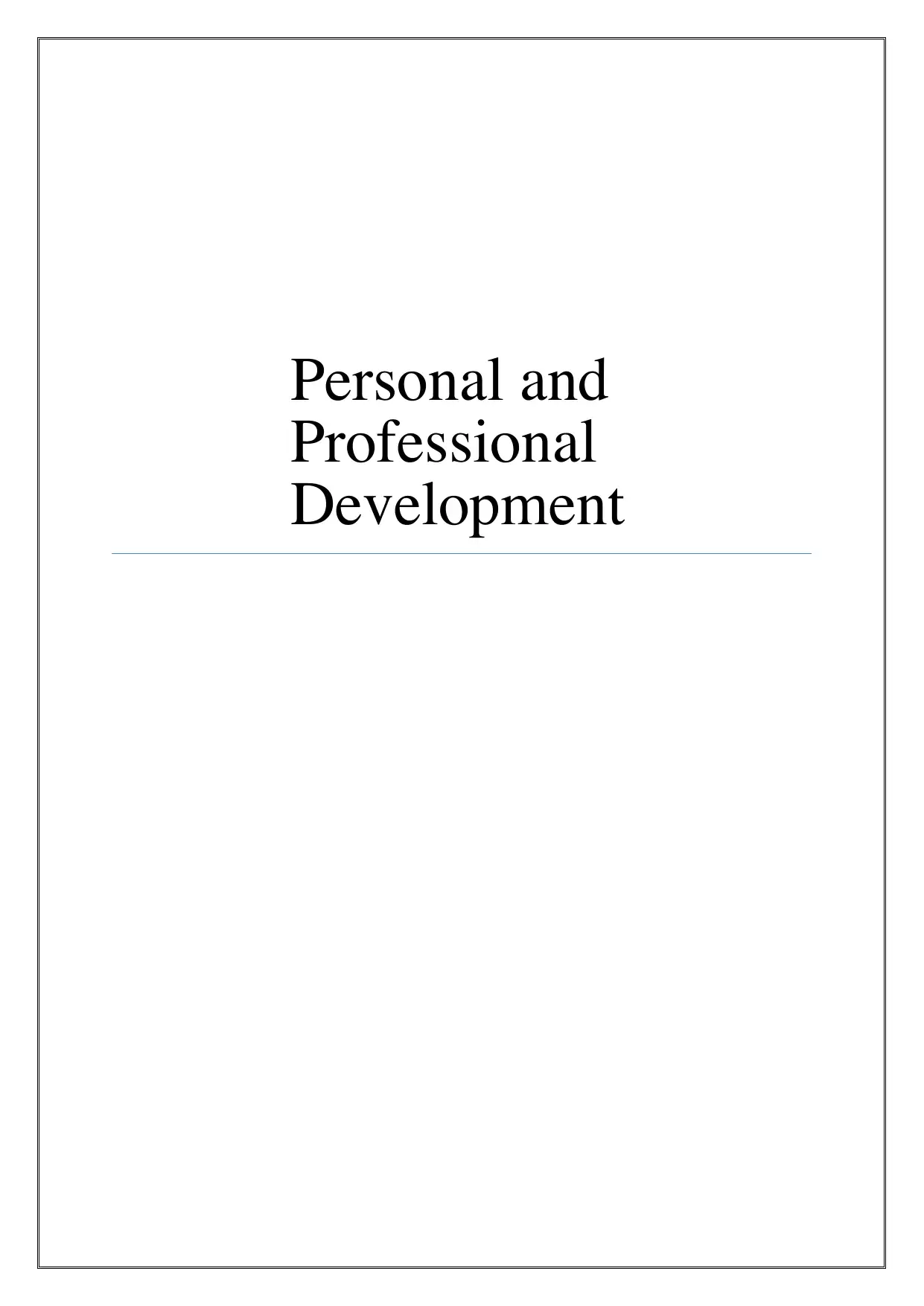
Secure Best Marks with AI Grader
Need help grading? Try our AI Grader for instant feedback on your assignments.
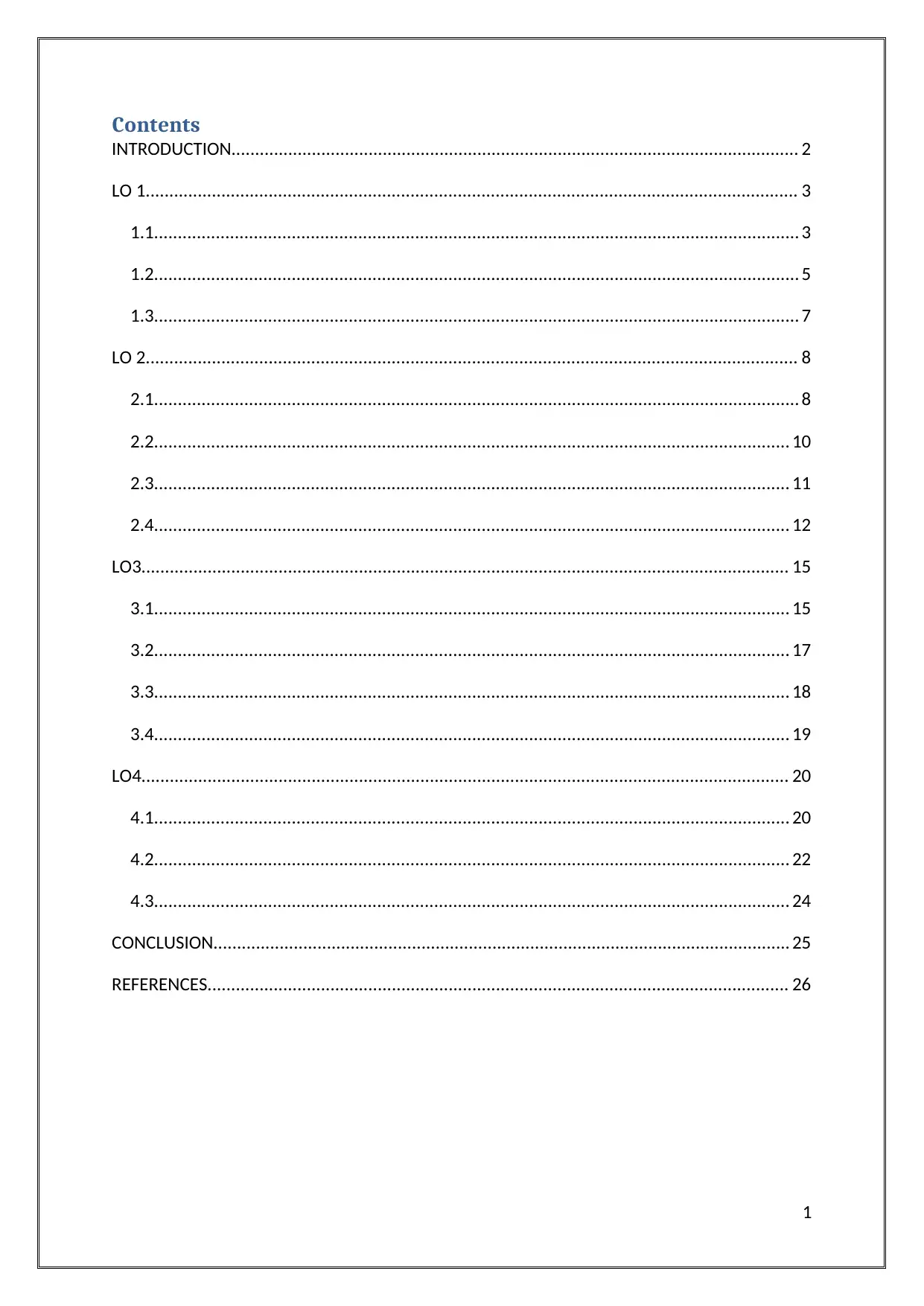
Contents
INTRODUCTION........................................................................................................................ 2
LO 1.......................................................................................................................................... 3
1.1........................................................................................................................................ 3
1.2........................................................................................................................................ 5
1.3........................................................................................................................................ 7
LO 2.......................................................................................................................................... 8
2.1........................................................................................................................................ 8
2.2...................................................................................................................................... 10
2.3...................................................................................................................................... 11
2.4...................................................................................................................................... 12
LO3......................................................................................................................................... 15
3.1...................................................................................................................................... 15
3.2...................................................................................................................................... 17
3.3...................................................................................................................................... 18
3.4...................................................................................................................................... 19
LO4......................................................................................................................................... 20
4.1...................................................................................................................................... 20
4.2...................................................................................................................................... 22
4.3...................................................................................................................................... 24
CONCLUSION.......................................................................................................................... 25
REFERENCES........................................................................................................................... 26
1
INTRODUCTION........................................................................................................................ 2
LO 1.......................................................................................................................................... 3
1.1........................................................................................................................................ 3
1.2........................................................................................................................................ 5
1.3........................................................................................................................................ 7
LO 2.......................................................................................................................................... 8
2.1........................................................................................................................................ 8
2.2...................................................................................................................................... 10
2.3...................................................................................................................................... 11
2.4...................................................................................................................................... 12
LO3......................................................................................................................................... 15
3.1...................................................................................................................................... 15
3.2...................................................................................................................................... 17
3.3...................................................................................................................................... 18
3.4...................................................................................................................................... 19
LO4......................................................................................................................................... 20
4.1...................................................................................................................................... 20
4.2...................................................................................................................................... 22
4.3...................................................................................................................................... 24
CONCLUSION.......................................................................................................................... 25
REFERENCES........................................................................................................................... 26
1
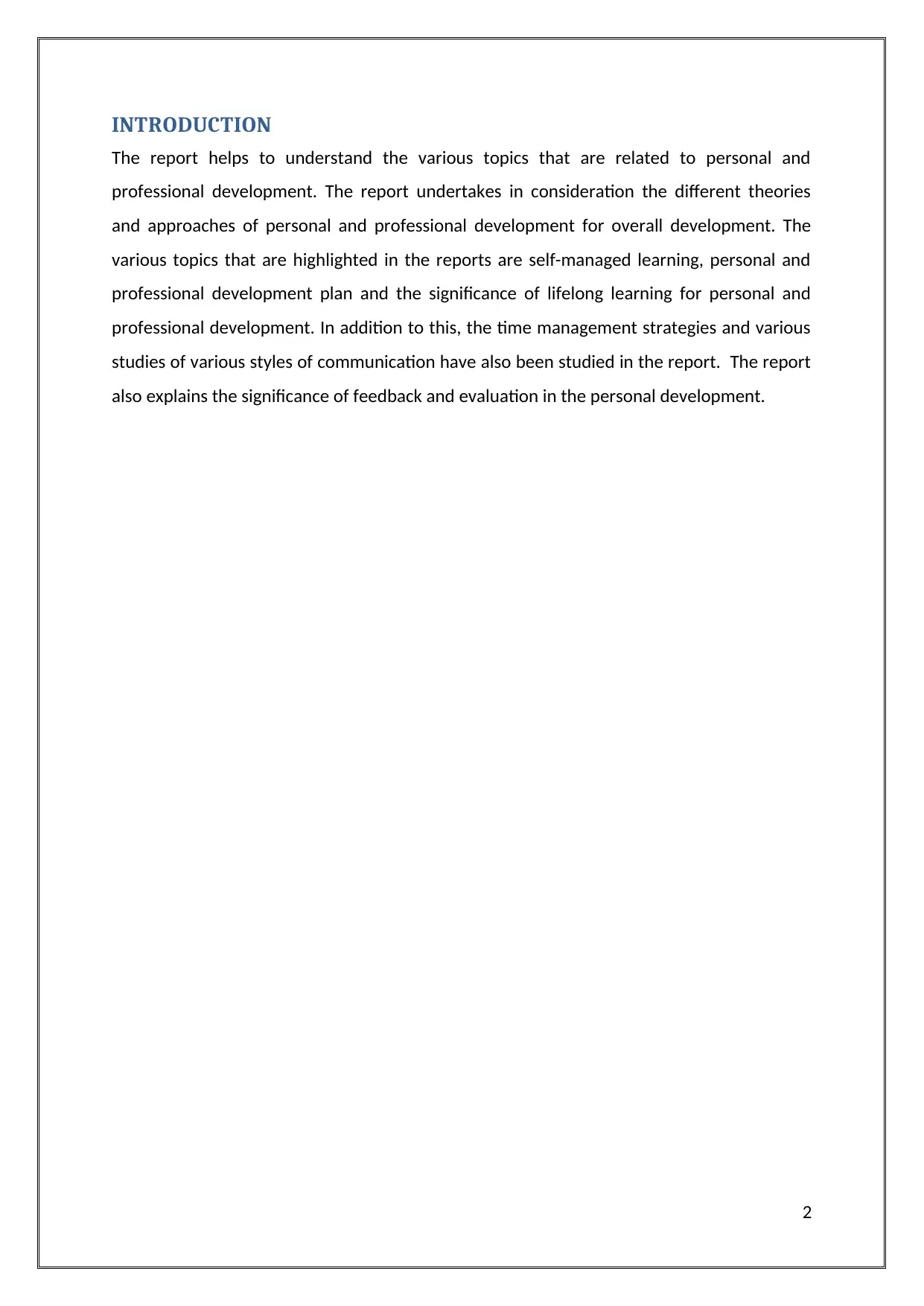
INTRODUCTION
The report helps to understand the various topics that are related to personal and
professional development. The report undertakes in consideration the different theories
and approaches of personal and professional development for overall development. The
various topics that are highlighted in the reports are self-managed learning, personal and
professional development plan and the significance of lifelong learning for personal and
professional development. In addition to this, the time management strategies and various
studies of various styles of communication have also been studied in the report. The report
also explains the significance of feedback and evaluation in the personal development.
2
The report helps to understand the various topics that are related to personal and
professional development. The report undertakes in consideration the different theories
and approaches of personal and professional development for overall development. The
various topics that are highlighted in the reports are self-managed learning, personal and
professional development plan and the significance of lifelong learning for personal and
professional development. In addition to this, the time management strategies and various
studies of various styles of communication have also been studied in the report. The report
also explains the significance of feedback and evaluation in the personal development.
2
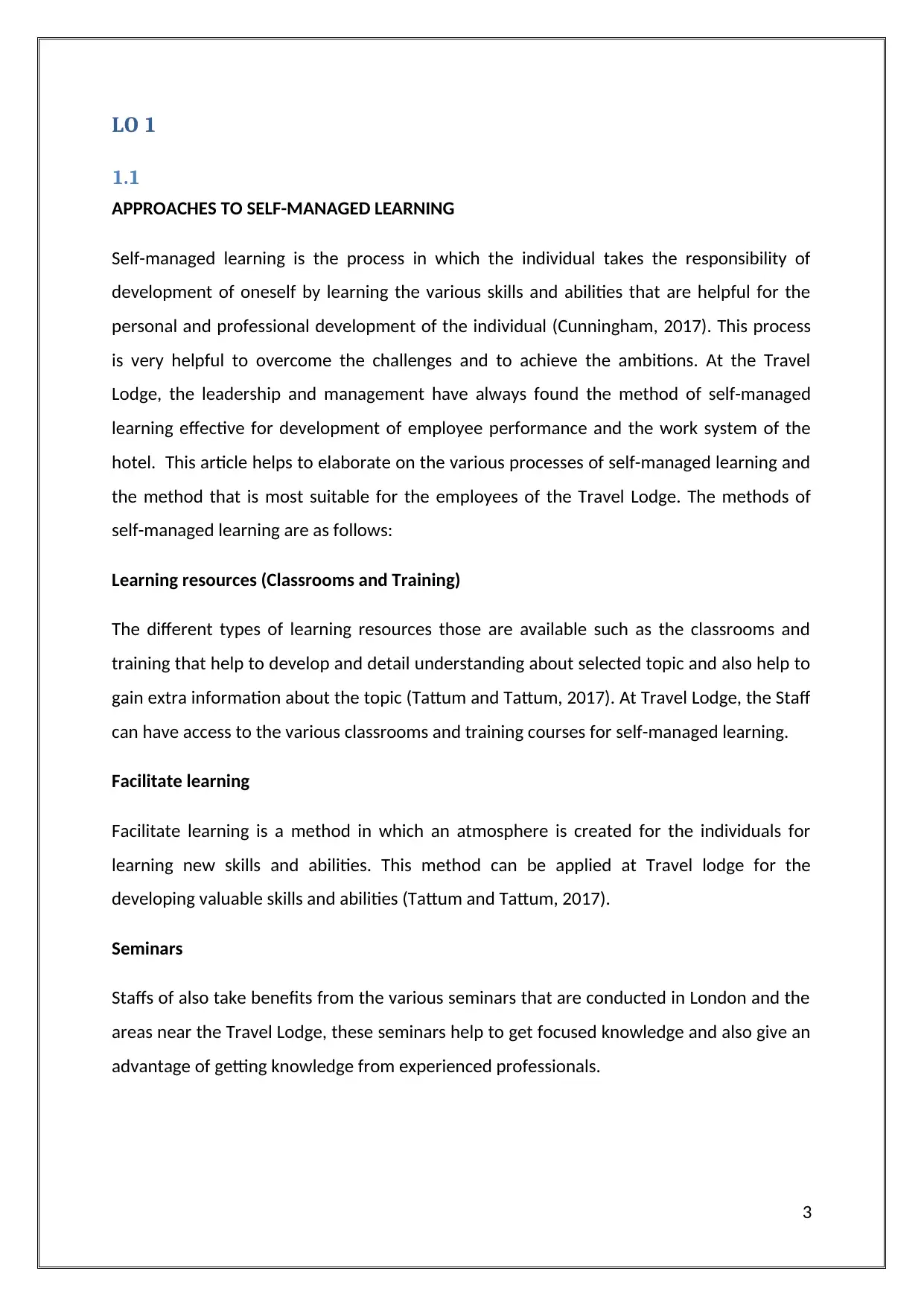
LO 1
1.1
APPROACHES TO SELF-MANAGED LEARNING
Self-managed learning is the process in which the individual takes the responsibility of
development of oneself by learning the various skills and abilities that are helpful for the
personal and professional development of the individual (Cunningham, 2017). This process
is very helpful to overcome the challenges and to achieve the ambitions. At the Travel
Lodge, the leadership and management have always found the method of self-managed
learning effective for development of employee performance and the work system of the
hotel. This article helps to elaborate on the various processes of self-managed learning and
the method that is most suitable for the employees of the Travel Lodge. The methods of
self-managed learning are as follows:
Learning resources (Classrooms and Training)
The different types of learning resources those are available such as the classrooms and
training that help to develop and detail understanding about selected topic and also help to
gain extra information about the topic (Tattum and Tattum, 2017). At Travel Lodge, the Staff
can have access to the various classrooms and training courses for self-managed learning.
Facilitate learning
Facilitate learning is a method in which an atmosphere is created for the individuals for
learning new skills and abilities. This method can be applied at Travel lodge for the
developing valuable skills and abilities (Tattum and Tattum, 2017).
Seminars
Staffs of also take benefits from the various seminars that are conducted in London and the
areas near the Travel Lodge, these seminars help to get focused knowledge and also give an
advantage of getting knowledge from experienced professionals.
3
1.1
APPROACHES TO SELF-MANAGED LEARNING
Self-managed learning is the process in which the individual takes the responsibility of
development of oneself by learning the various skills and abilities that are helpful for the
personal and professional development of the individual (Cunningham, 2017). This process
is very helpful to overcome the challenges and to achieve the ambitions. At the Travel
Lodge, the leadership and management have always found the method of self-managed
learning effective for development of employee performance and the work system of the
hotel. This article helps to elaborate on the various processes of self-managed learning and
the method that is most suitable for the employees of the Travel Lodge. The methods of
self-managed learning are as follows:
Learning resources (Classrooms and Training)
The different types of learning resources those are available such as the classrooms and
training that help to develop and detail understanding about selected topic and also help to
gain extra information about the topic (Tattum and Tattum, 2017). At Travel Lodge, the Staff
can have access to the various classrooms and training courses for self-managed learning.
Facilitate learning
Facilitate learning is a method in which an atmosphere is created for the individuals for
learning new skills and abilities. This method can be applied at Travel lodge for the
developing valuable skills and abilities (Tattum and Tattum, 2017).
Seminars
Staffs of also take benefits from the various seminars that are conducted in London and the
areas near the Travel Lodge, these seminars help to get focused knowledge and also give an
advantage of getting knowledge from experienced professionals.
3
Secure Best Marks with AI Grader
Need help grading? Try our AI Grader for instant feedback on your assignments.
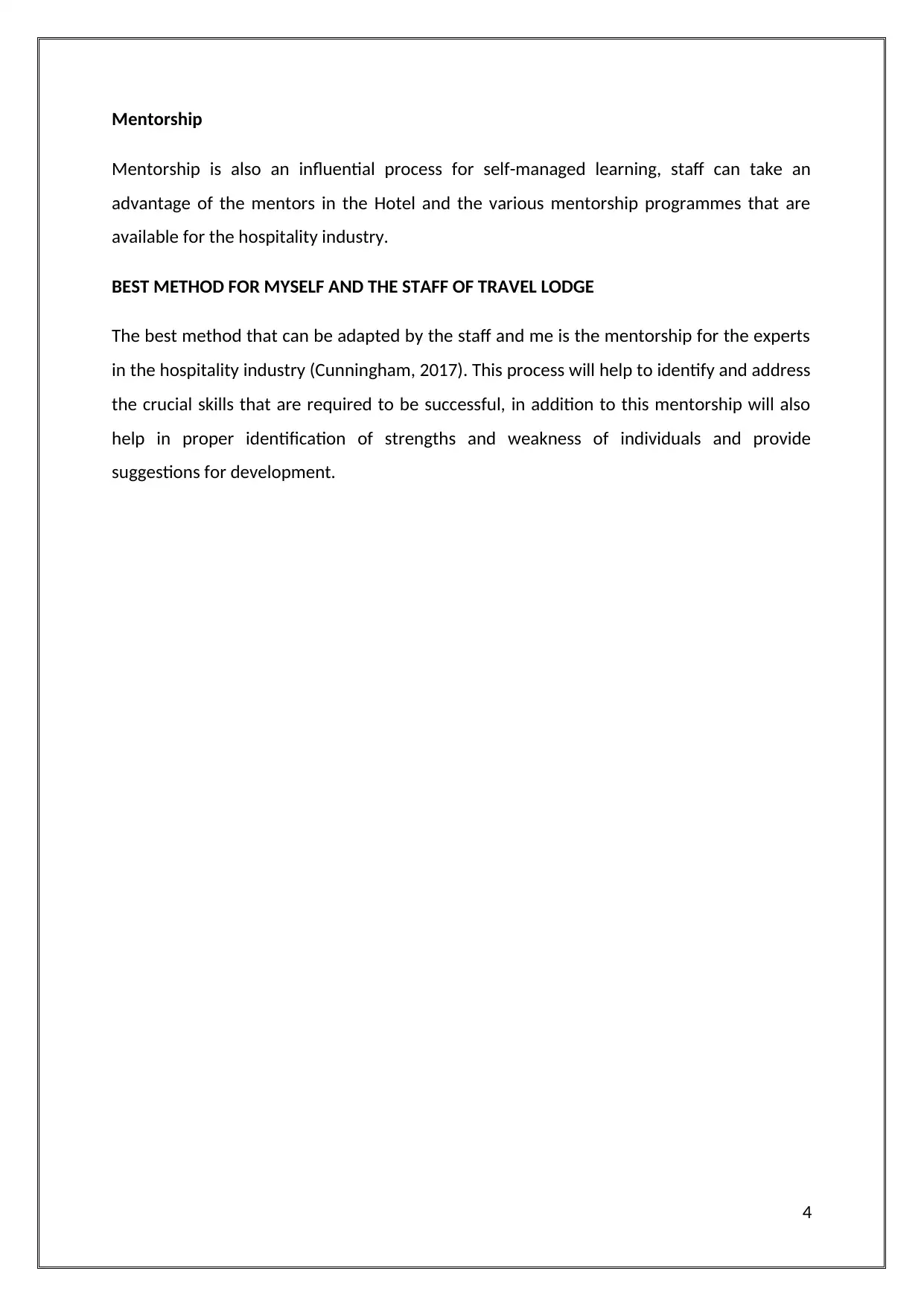
Mentorship
Mentorship is also an influential process for self-managed learning, staff can take an
advantage of the mentors in the Hotel and the various mentorship programmes that are
available for the hospitality industry.
BEST METHOD FOR MYSELF AND THE STAFF OF TRAVEL LODGE
The best method that can be adapted by the staff and me is the mentorship for the experts
in the hospitality industry (Cunningham, 2017). This process will help to identify and address
the crucial skills that are required to be successful, in addition to this mentorship will also
help in proper identification of strengths and weakness of individuals and provide
suggestions for development.
4
Mentorship is also an influential process for self-managed learning, staff can take an
advantage of the mentors in the Hotel and the various mentorship programmes that are
available for the hospitality industry.
BEST METHOD FOR MYSELF AND THE STAFF OF TRAVEL LODGE
The best method that can be adapted by the staff and me is the mentorship for the experts
in the hospitality industry (Cunningham, 2017). This process will help to identify and address
the crucial skills that are required to be successful, in addition to this mentorship will also
help in proper identification of strengths and weakness of individuals and provide
suggestions for development.
4
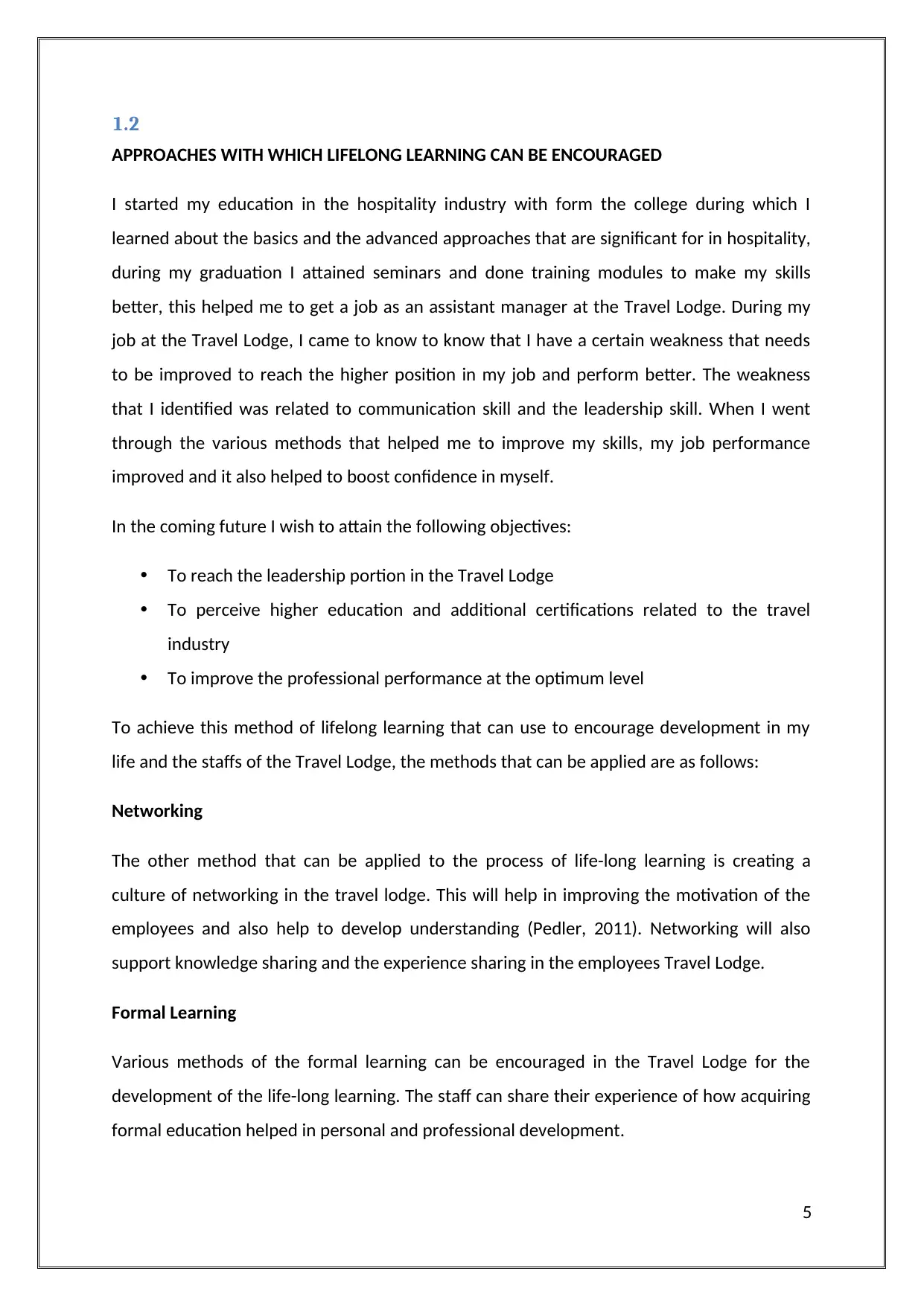
1.2
APPROACHES WITH WHICH LIFELONG LEARNING CAN BE ENCOURAGED
I started my education in the hospitality industry with form the college during which I
learned about the basics and the advanced approaches that are significant for in hospitality,
during my graduation I attained seminars and done training modules to make my skills
better, this helped me to get a job as an assistant manager at the Travel Lodge. During my
job at the Travel Lodge, I came to know to know that I have a certain weakness that needs
to be improved to reach the higher position in my job and perform better. The weakness
that I identified was related to communication skill and the leadership skill. When I went
through the various methods that helped me to improve my skills, my job performance
improved and it also helped to boost confidence in myself.
In the coming future I wish to attain the following objectives:
To reach the leadership portion in the Travel Lodge
To perceive higher education and additional certifications related to the travel
industry
To improve the professional performance at the optimum level
To achieve this method of lifelong learning that can use to encourage development in my
life and the staffs of the Travel Lodge, the methods that can be applied are as follows:
Networking
The other method that can be applied to the process of life-long learning is creating a
culture of networking in the travel lodge. This will help in improving the motivation of the
employees and also help to develop understanding (Pedler, 2011). Networking will also
support knowledge sharing and the experience sharing in the employees Travel Lodge.
Formal Learning
Various methods of the formal learning can be encouraged in the Travel Lodge for the
development of the life-long learning. The staff can share their experience of how acquiring
formal education helped in personal and professional development.
5
APPROACHES WITH WHICH LIFELONG LEARNING CAN BE ENCOURAGED
I started my education in the hospitality industry with form the college during which I
learned about the basics and the advanced approaches that are significant for in hospitality,
during my graduation I attained seminars and done training modules to make my skills
better, this helped me to get a job as an assistant manager at the Travel Lodge. During my
job at the Travel Lodge, I came to know to know that I have a certain weakness that needs
to be improved to reach the higher position in my job and perform better. The weakness
that I identified was related to communication skill and the leadership skill. When I went
through the various methods that helped me to improve my skills, my job performance
improved and it also helped to boost confidence in myself.
In the coming future I wish to attain the following objectives:
To reach the leadership portion in the Travel Lodge
To perceive higher education and additional certifications related to the travel
industry
To improve the professional performance at the optimum level
To achieve this method of lifelong learning that can use to encourage development in my
life and the staffs of the Travel Lodge, the methods that can be applied are as follows:
Networking
The other method that can be applied to the process of life-long learning is creating a
culture of networking in the travel lodge. This will help in improving the motivation of the
employees and also help to develop understanding (Pedler, 2011). Networking will also
support knowledge sharing and the experience sharing in the employees Travel Lodge.
Formal Learning
Various methods of the formal learning can be encouraged in the Travel Lodge for the
development of the life-long learning. The staff can share their experience of how acquiring
formal education helped in personal and professional development.
5
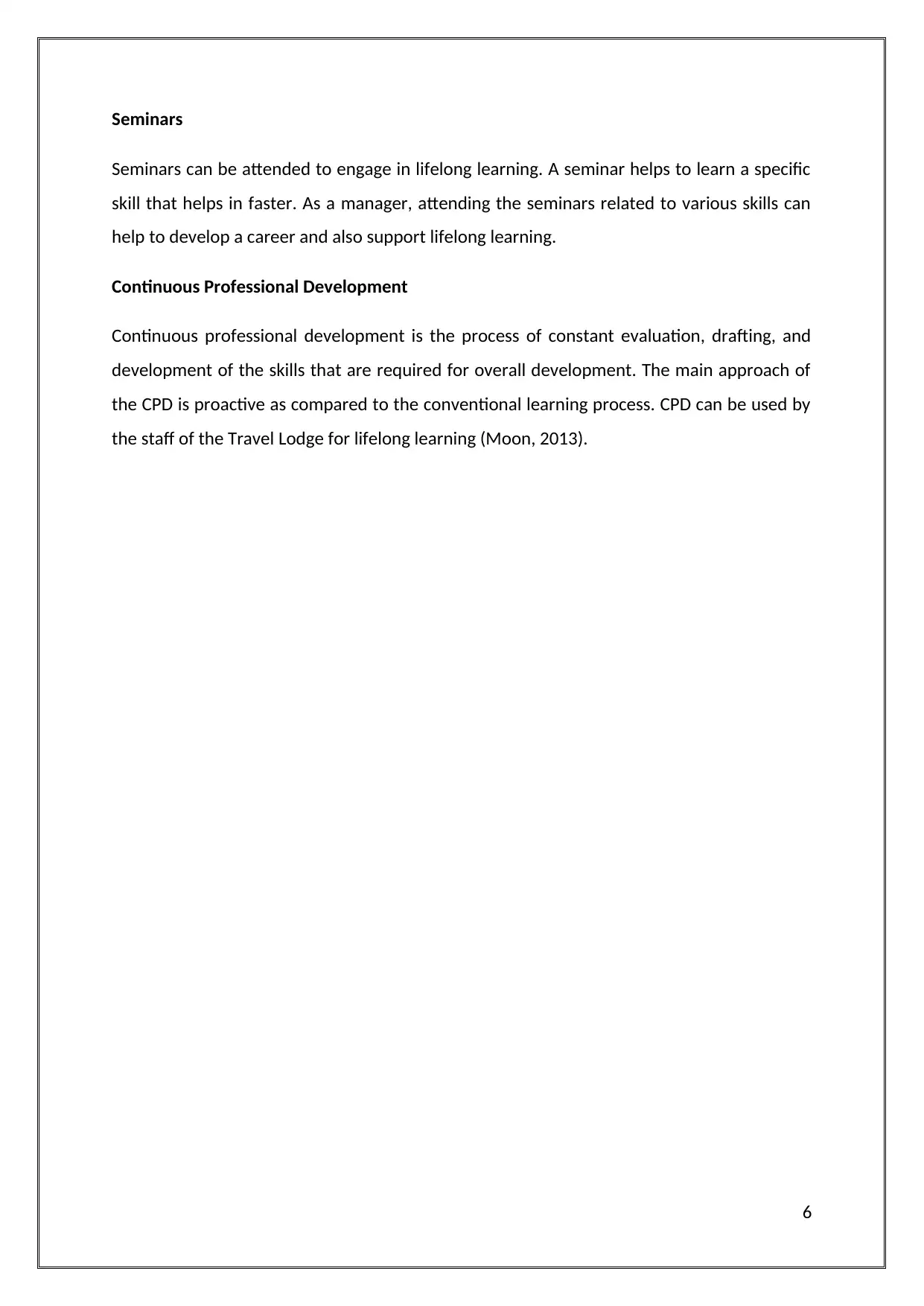
Seminars
Seminars can be attended to engage in lifelong learning. A seminar helps to learn a specific
skill that helps in faster. As a manager, attending the seminars related to various skills can
help to develop a career and also support lifelong learning.
Continuous Professional Development
Continuous professional development is the process of constant evaluation, drafting, and
development of the skills that are required for overall development. The main approach of
the CPD is proactive as compared to the conventional learning process. CPD can be used by
the staff of the Travel Lodge for lifelong learning (Moon, 2013).
6
Seminars can be attended to engage in lifelong learning. A seminar helps to learn a specific
skill that helps in faster. As a manager, attending the seminars related to various skills can
help to develop a career and also support lifelong learning.
Continuous Professional Development
Continuous professional development is the process of constant evaluation, drafting, and
development of the skills that are required for overall development. The main approach of
the CPD is proactive as compared to the conventional learning process. CPD can be used by
the staff of the Travel Lodge for lifelong learning (Moon, 2013).
6
Paraphrase This Document
Need a fresh take? Get an instant paraphrase of this document with our AI Paraphraser
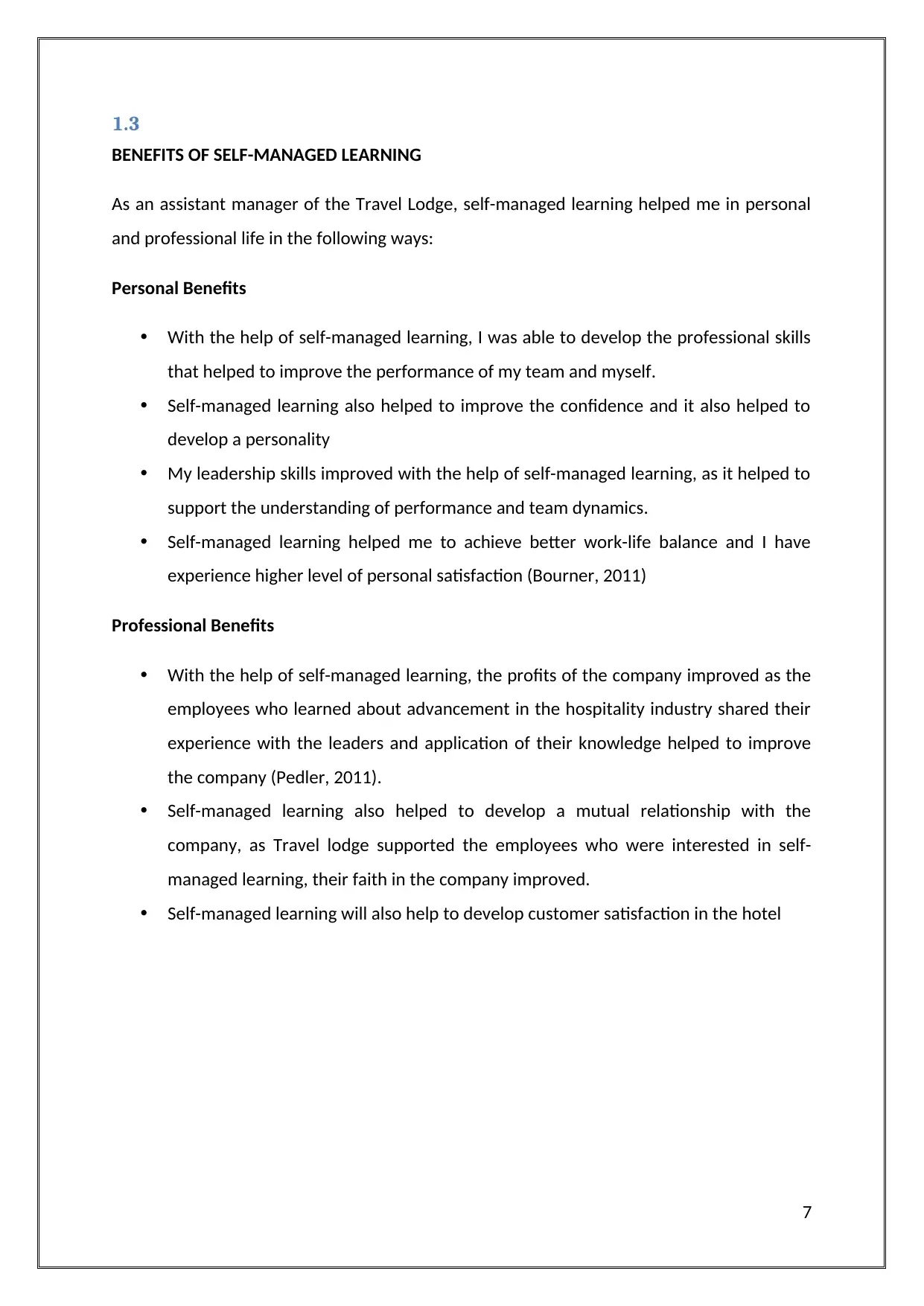
1.3
BENEFITS OF SELF-MANAGED LEARNING
As an assistant manager of the Travel Lodge, self-managed learning helped me in personal
and professional life in the following ways:
Personal Benefits
With the help of self-managed learning, I was able to develop the professional skills
that helped to improve the performance of my team and myself.
Self-managed learning also helped to improve the confidence and it also helped to
develop a personality
My leadership skills improved with the help of self-managed learning, as it helped to
support the understanding of performance and team dynamics.
Self-managed learning helped me to achieve better work-life balance and I have
experience higher level of personal satisfaction (Bourner, 2011)
Professional Benefits
With the help of self-managed learning, the profits of the company improved as the
employees who learned about advancement in the hospitality industry shared their
experience with the leaders and application of their knowledge helped to improve
the company (Pedler, 2011).
Self-managed learning also helped to develop a mutual relationship with the
company, as Travel lodge supported the employees who were interested in self-
managed learning, their faith in the company improved.
Self-managed learning will also help to develop customer satisfaction in the hotel
7
BENEFITS OF SELF-MANAGED LEARNING
As an assistant manager of the Travel Lodge, self-managed learning helped me in personal
and professional life in the following ways:
Personal Benefits
With the help of self-managed learning, I was able to develop the professional skills
that helped to improve the performance of my team and myself.
Self-managed learning also helped to improve the confidence and it also helped to
develop a personality
My leadership skills improved with the help of self-managed learning, as it helped to
support the understanding of performance and team dynamics.
Self-managed learning helped me to achieve better work-life balance and I have
experience higher level of personal satisfaction (Bourner, 2011)
Professional Benefits
With the help of self-managed learning, the profits of the company improved as the
employees who learned about advancement in the hospitality industry shared their
experience with the leaders and application of their knowledge helped to improve
the company (Pedler, 2011).
Self-managed learning also helped to develop a mutual relationship with the
company, as Travel lodge supported the employees who were interested in self-
managed learning, their faith in the company improved.
Self-managed learning will also help to develop customer satisfaction in the hotel
7
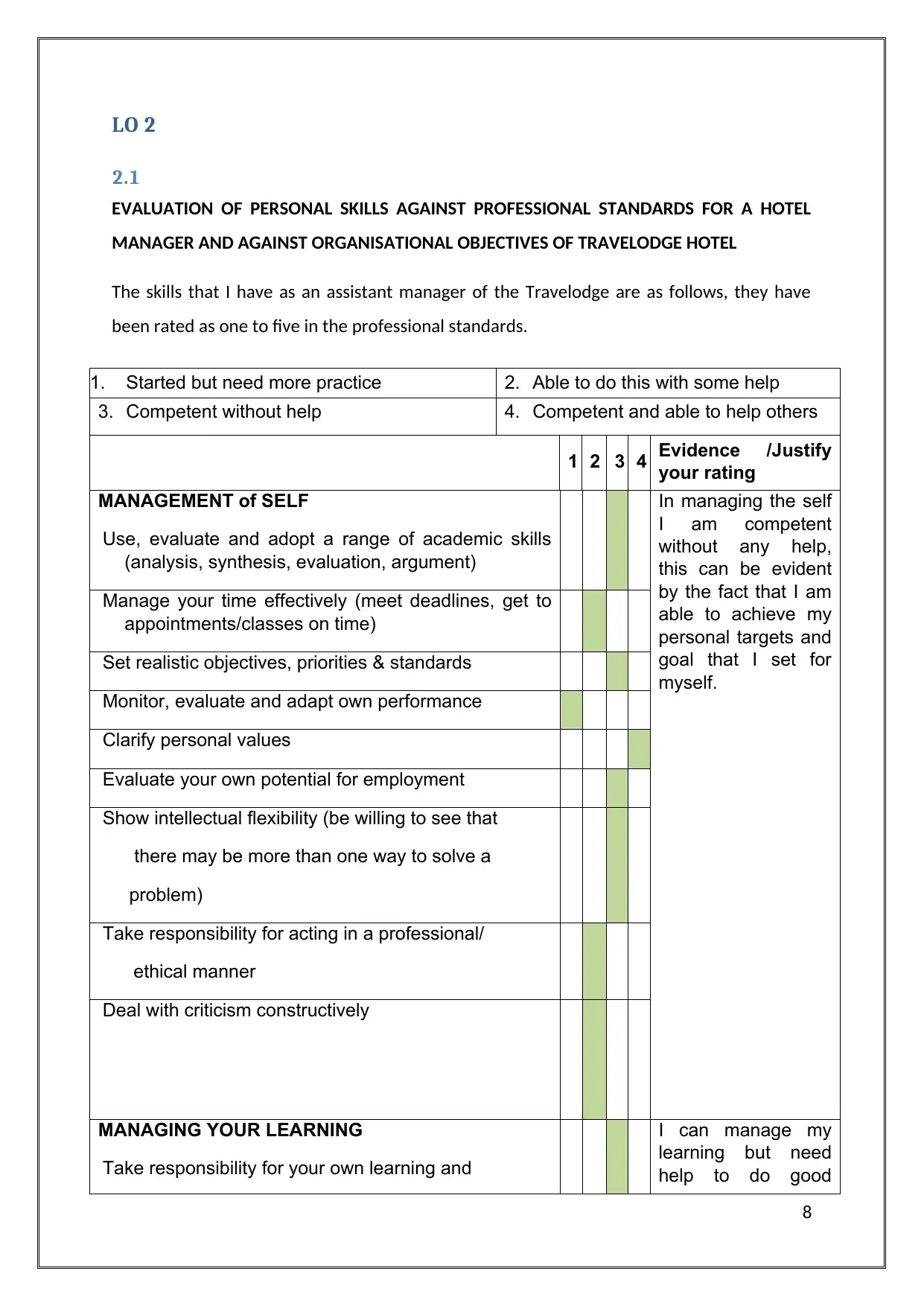
LO 2
2.1
EVALUATION OF PERSONAL SKILLS AGAINST PROFESSIONAL STANDARDS FOR A HOTEL
MANAGER AND AGAINST ORGANISATIONAL OBJECTIVES OF TRAVELODGE HOTEL
The skills that I have as an assistant manager of the Travelodge are as follows, they have
been rated as one to five in the professional standards.
1. Started but need more practice 2. Able to do this with some help
3. Competent without help 4. Competent and able to help others
1 2 3 4 Evidence /Justify
your rating
MANAGEMENT of SELF
Use, evaluate and adopt a range of academic skills
(analysis, synthesis, evaluation, argument)
In managing the self
I am competent
without any help,
this can be evident
by the fact that I am
able to achieve my
personal targets and
goal that I set for
myself.
Manage your time effectively (meet deadlines, get to
appointments/classes on time)
Set realistic objectives, priorities & standards
Monitor, evaluate and adapt own performance
Clarify personal values
Evaluate your own potential for employment
Show intellectual flexibility (be willing to see that
there may be more than one way to solve a
problem)
Take responsibility for acting in a professional/
ethical manner
Deal with criticism constructively
MANAGING YOUR LEARNING
Take responsibility for your own learning and
I can manage my
learning but need
help to do good
8
2.1
EVALUATION OF PERSONAL SKILLS AGAINST PROFESSIONAL STANDARDS FOR A HOTEL
MANAGER AND AGAINST ORGANISATIONAL OBJECTIVES OF TRAVELODGE HOTEL
The skills that I have as an assistant manager of the Travelodge are as follows, they have
been rated as one to five in the professional standards.
1. Started but need more practice 2. Able to do this with some help
3. Competent without help 4. Competent and able to help others
1 2 3 4 Evidence /Justify
your rating
MANAGEMENT of SELF
Use, evaluate and adopt a range of academic skills
(analysis, synthesis, evaluation, argument)
In managing the self
I am competent
without any help,
this can be evident
by the fact that I am
able to achieve my
personal targets and
goal that I set for
myself.
Manage your time effectively (meet deadlines, get to
appointments/classes on time)
Set realistic objectives, priorities & standards
Monitor, evaluate and adapt own performance
Clarify personal values
Evaluate your own potential for employment
Show intellectual flexibility (be willing to see that
there may be more than one way to solve a
problem)
Take responsibility for acting in a professional/
ethical manner
Deal with criticism constructively
MANAGING YOUR LEARNING
Take responsibility for your own learning and
I can manage my
learning but need
help to do good
8
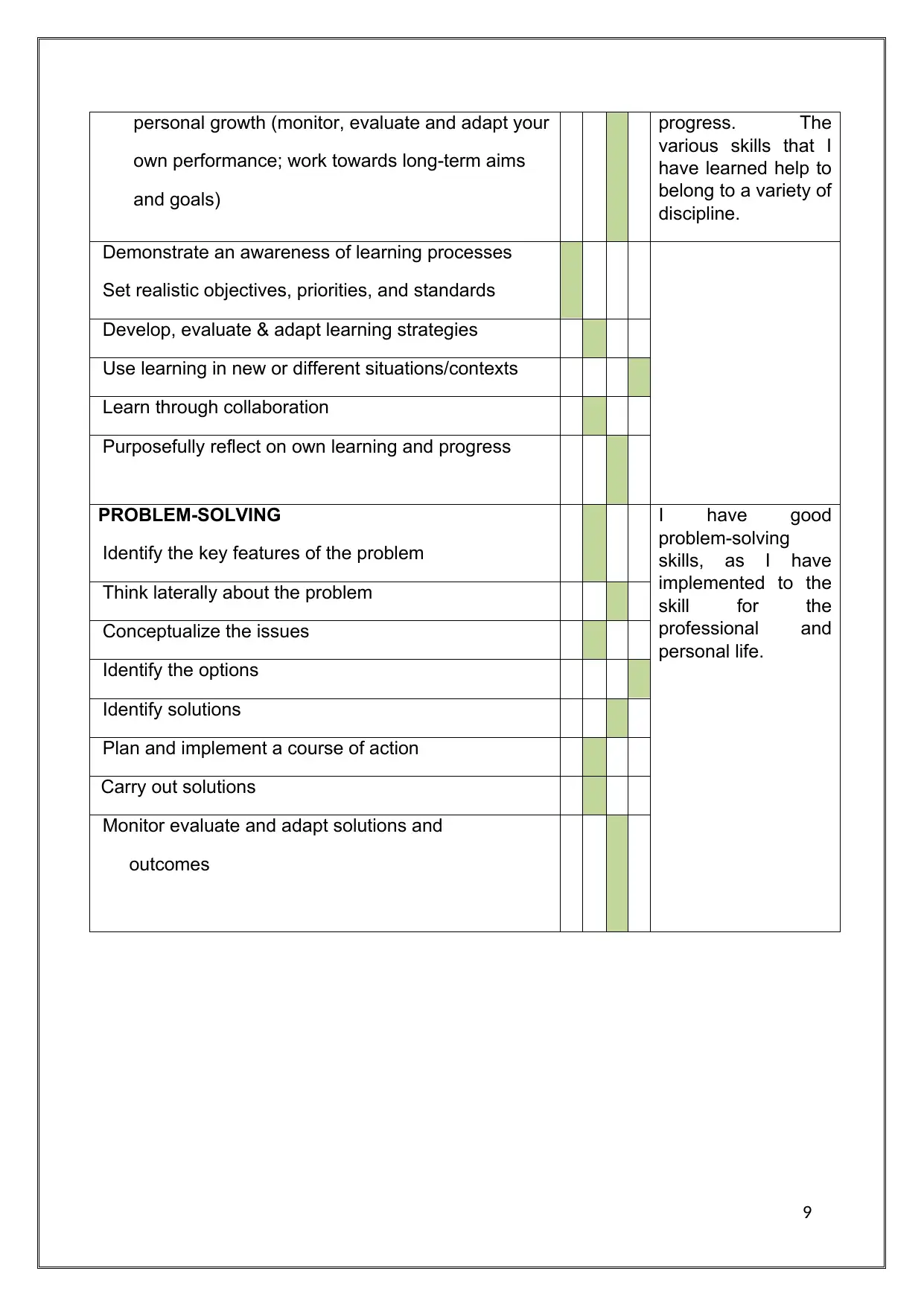
personal growth (monitor, evaluate and adapt your
own performance; work towards long-term aims
and goals)
progress. The
various skills that I
have learned help to
belong to a variety of
discipline.
Demonstrate an awareness of learning processes
Set realistic objectives, priorities, and standards
Develop, evaluate & adapt learning strategies
Use learning in new or different situations/contexts
Learn through collaboration
Purposefully reflect on own learning and progress
PROBLEM-SOLVING
Identify the key features of the problem
I have good
problem-solving
skills, as I have
implemented to the
skill for the
professional and
personal life.
Think laterally about the problem
Conceptualize the issues
Identify the options
Identify solutions
Plan and implement a course of action
Carry out solutions
Monitor evaluate and adapt solutions and
outcomes
9
own performance; work towards long-term aims
and goals)
progress. The
various skills that I
have learned help to
belong to a variety of
discipline.
Demonstrate an awareness of learning processes
Set realistic objectives, priorities, and standards
Develop, evaluate & adapt learning strategies
Use learning in new or different situations/contexts
Learn through collaboration
Purposefully reflect on own learning and progress
PROBLEM-SOLVING
Identify the key features of the problem
I have good
problem-solving
skills, as I have
implemented to the
skill for the
professional and
personal life.
Think laterally about the problem
Conceptualize the issues
Identify the options
Identify solutions
Plan and implement a course of action
Carry out solutions
Monitor evaluate and adapt solutions and
outcomes
9
Secure Best Marks with AI Grader
Need help grading? Try our AI Grader for instant feedback on your assignments.
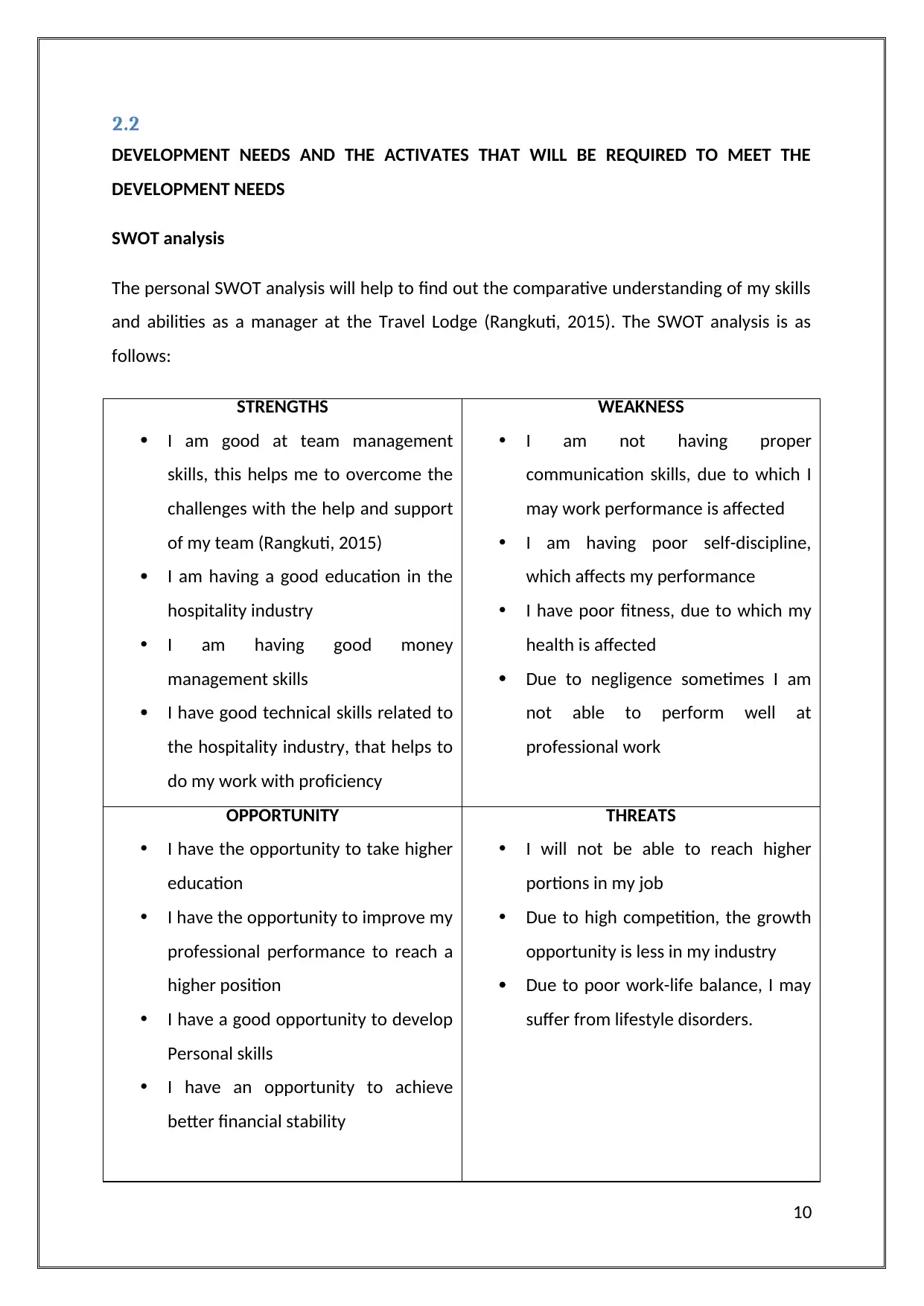
2.2
DEVELOPMENT NEEDS AND THE ACTIVATES THAT WILL BE REQUIRED TO MEET THE
DEVELOPMENT NEEDS
SWOT analysis
The personal SWOT analysis will help to find out the comparative understanding of my skills
and abilities as a manager at the Travel Lodge (Rangkuti, 2015). The SWOT analysis is as
follows:
STRENGTHS
I am good at team management
skills, this helps me to overcome the
challenges with the help and support
of my team (Rangkuti, 2015)
I am having a good education in the
hospitality industry
I am having good money
management skills
I have good technical skills related to
the hospitality industry, that helps to
do my work with proficiency
WEAKNESS
I am not having proper
communication skills, due to which I
may work performance is affected
I am having poor self-discipline,
which affects my performance
I have poor fitness, due to which my
health is affected
Due to negligence sometimes I am
not able to perform well at
professional work
OPPORTUNITY
I have the opportunity to take higher
education
I have the opportunity to improve my
professional performance to reach a
higher position
I have a good opportunity to develop
Personal skills
I have an opportunity to achieve
better financial stability
THREATS
I will not be able to reach higher
portions in my job
Due to high competition, the growth
opportunity is less in my industry
Due to poor work-life balance, I may
suffer from lifestyle disorders.
10
DEVELOPMENT NEEDS AND THE ACTIVATES THAT WILL BE REQUIRED TO MEET THE
DEVELOPMENT NEEDS
SWOT analysis
The personal SWOT analysis will help to find out the comparative understanding of my skills
and abilities as a manager at the Travel Lodge (Rangkuti, 2015). The SWOT analysis is as
follows:
STRENGTHS
I am good at team management
skills, this helps me to overcome the
challenges with the help and support
of my team (Rangkuti, 2015)
I am having a good education in the
hospitality industry
I am having good money
management skills
I have good technical skills related to
the hospitality industry, that helps to
do my work with proficiency
WEAKNESS
I am not having proper
communication skills, due to which I
may work performance is affected
I am having poor self-discipline,
which affects my performance
I have poor fitness, due to which my
health is affected
Due to negligence sometimes I am
not able to perform well at
professional work
OPPORTUNITY
I have the opportunity to take higher
education
I have the opportunity to improve my
professional performance to reach a
higher position
I have a good opportunity to develop
Personal skills
I have an opportunity to achieve
better financial stability
THREATS
I will not be able to reach higher
portions in my job
Due to high competition, the growth
opportunity is less in my industry
Due to poor work-life balance, I may
suffer from lifestyle disorders.
10
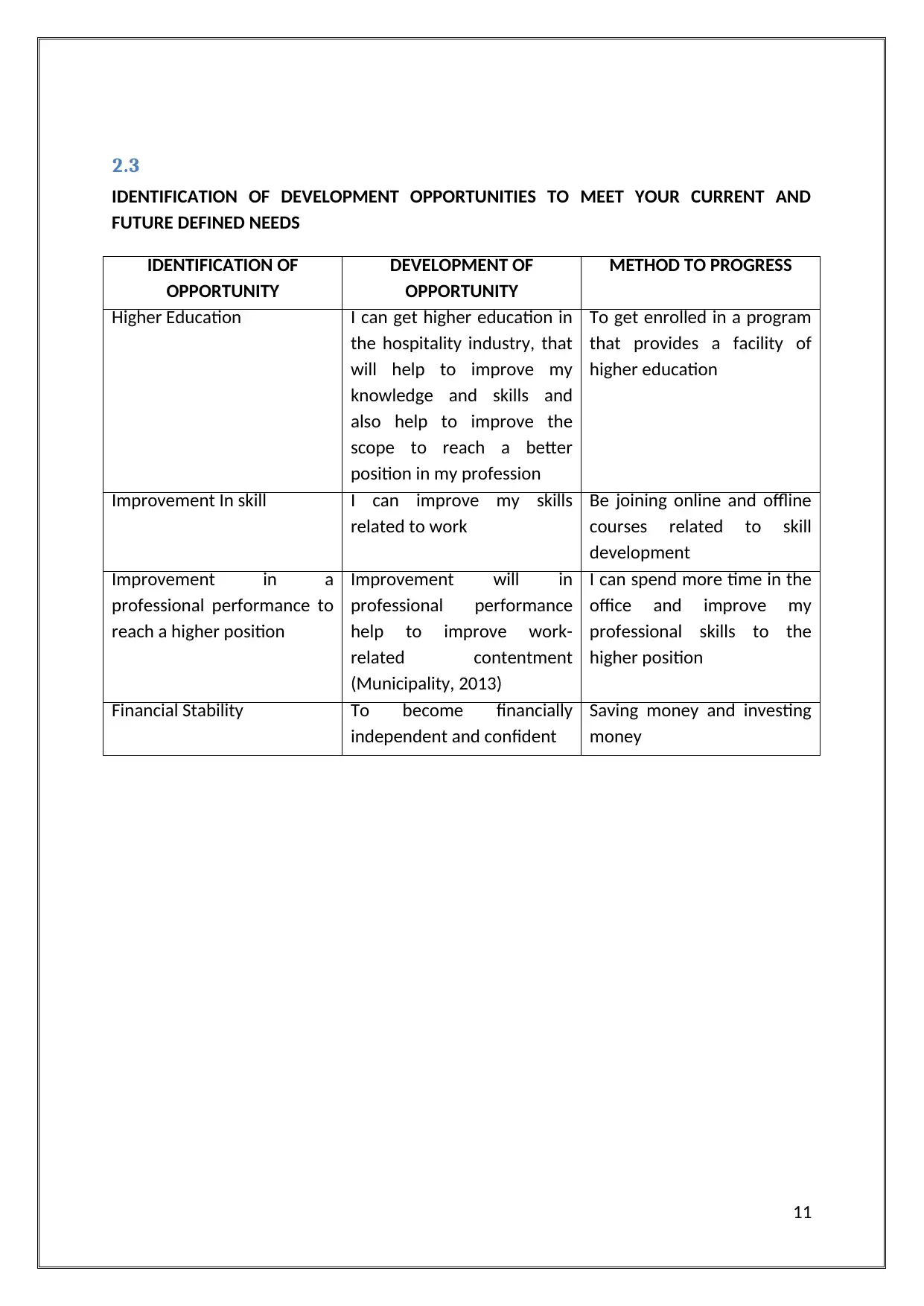
2.3
IDENTIFICATION OF DEVELOPMENT OPPORTUNITIES TO MEET YOUR CURRENT AND
FUTURE DEFINED NEEDS
IDENTIFICATION OF
OPPORTUNITY
DEVELOPMENT OF
OPPORTUNITY
METHOD TO PROGRESS
Higher Education I can get higher education in
the hospitality industry, that
will help to improve my
knowledge and skills and
also help to improve the
scope to reach a better
position in my profession
To get enrolled in a program
that provides a facility of
higher education
Improvement In skill I can improve my skills
related to work
Be joining online and offline
courses related to skill
development
Improvement in a
professional performance to
reach a higher position
Improvement will in
professional performance
help to improve work-
related contentment
(Municipality, 2013)
I can spend more time in the
office and improve my
professional skills to the
higher position
Financial Stability To become financially
independent and confident
Saving money and investing
money
11
IDENTIFICATION OF DEVELOPMENT OPPORTUNITIES TO MEET YOUR CURRENT AND
FUTURE DEFINED NEEDS
IDENTIFICATION OF
OPPORTUNITY
DEVELOPMENT OF
OPPORTUNITY
METHOD TO PROGRESS
Higher Education I can get higher education in
the hospitality industry, that
will help to improve my
knowledge and skills and
also help to improve the
scope to reach a better
position in my profession
To get enrolled in a program
that provides a facility of
higher education
Improvement In skill I can improve my skills
related to work
Be joining online and offline
courses related to skill
development
Improvement in a
professional performance to
reach a higher position
Improvement will in
professional performance
help to improve work-
related contentment
(Municipality, 2013)
I can spend more time in the
office and improve my
professional skills to the
higher position
Financial Stability To become financially
independent and confident
Saving money and investing
money
11
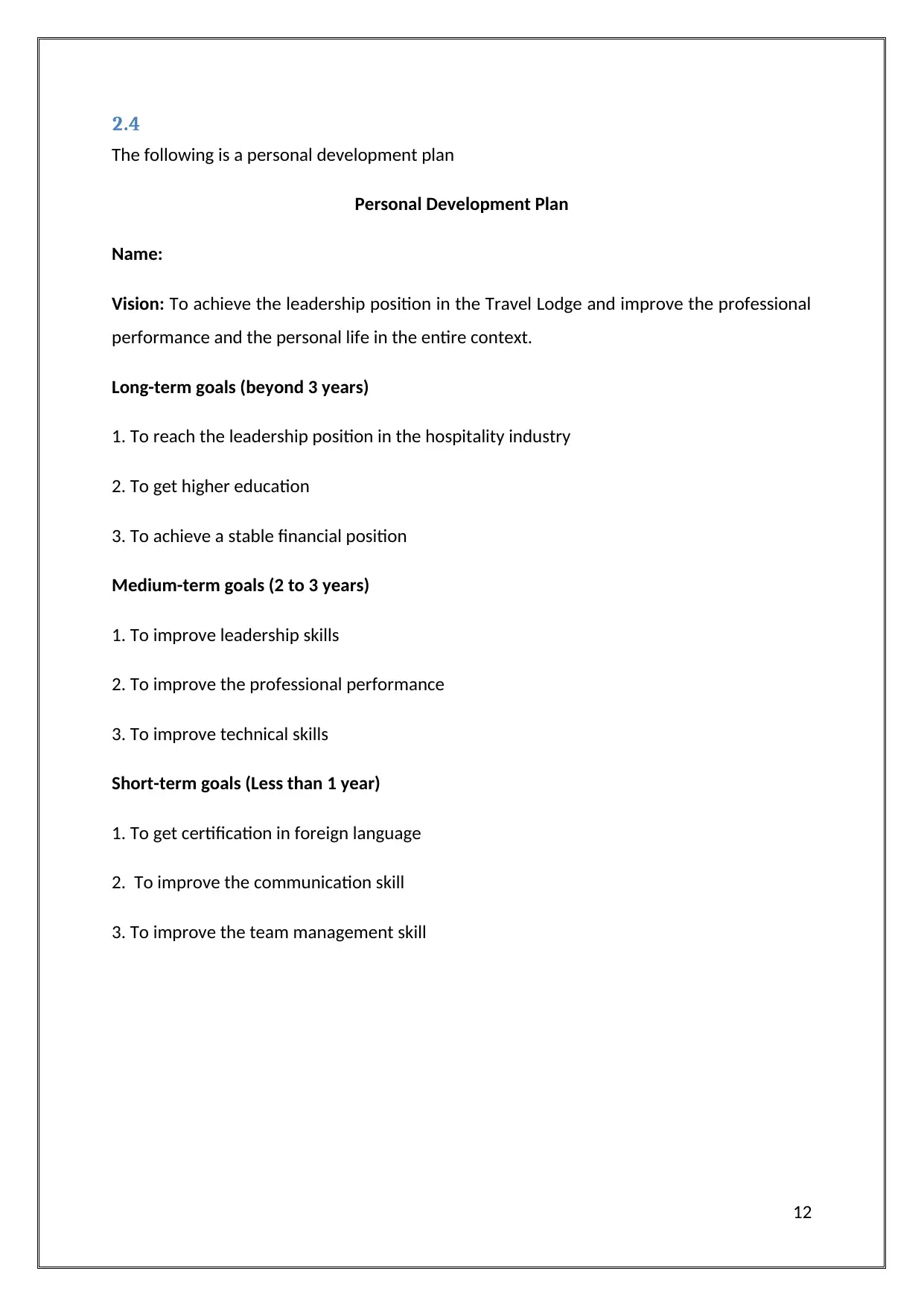
2.4
The following is a personal development plan
Personal Development Plan
Name:
Vision: To achieve the leadership position in the Travel Lodge and improve the professional
performance and the personal life in the entire context.
Long-term goals (beyond 3 years)
1. To reach the leadership position in the hospitality industry
2. To get higher education
3. To achieve a stable financial position
Medium-term goals (2 to 3 years)
1. To improve leadership skills
2. To improve the professional performance
3. To improve technical skills
Short-term goals (Less than 1 year)
1. To get certification in foreign language
2. To improve the communication skill
3. To improve the team management skill
12
The following is a personal development plan
Personal Development Plan
Name:
Vision: To achieve the leadership position in the Travel Lodge and improve the professional
performance and the personal life in the entire context.
Long-term goals (beyond 3 years)
1. To reach the leadership position in the hospitality industry
2. To get higher education
3. To achieve a stable financial position
Medium-term goals (2 to 3 years)
1. To improve leadership skills
2. To improve the professional performance
3. To improve technical skills
Short-term goals (Less than 1 year)
1. To get certification in foreign language
2. To improve the communication skill
3. To improve the team management skill
12
Paraphrase This Document
Need a fresh take? Get an instant paraphrase of this document with our AI Paraphraser
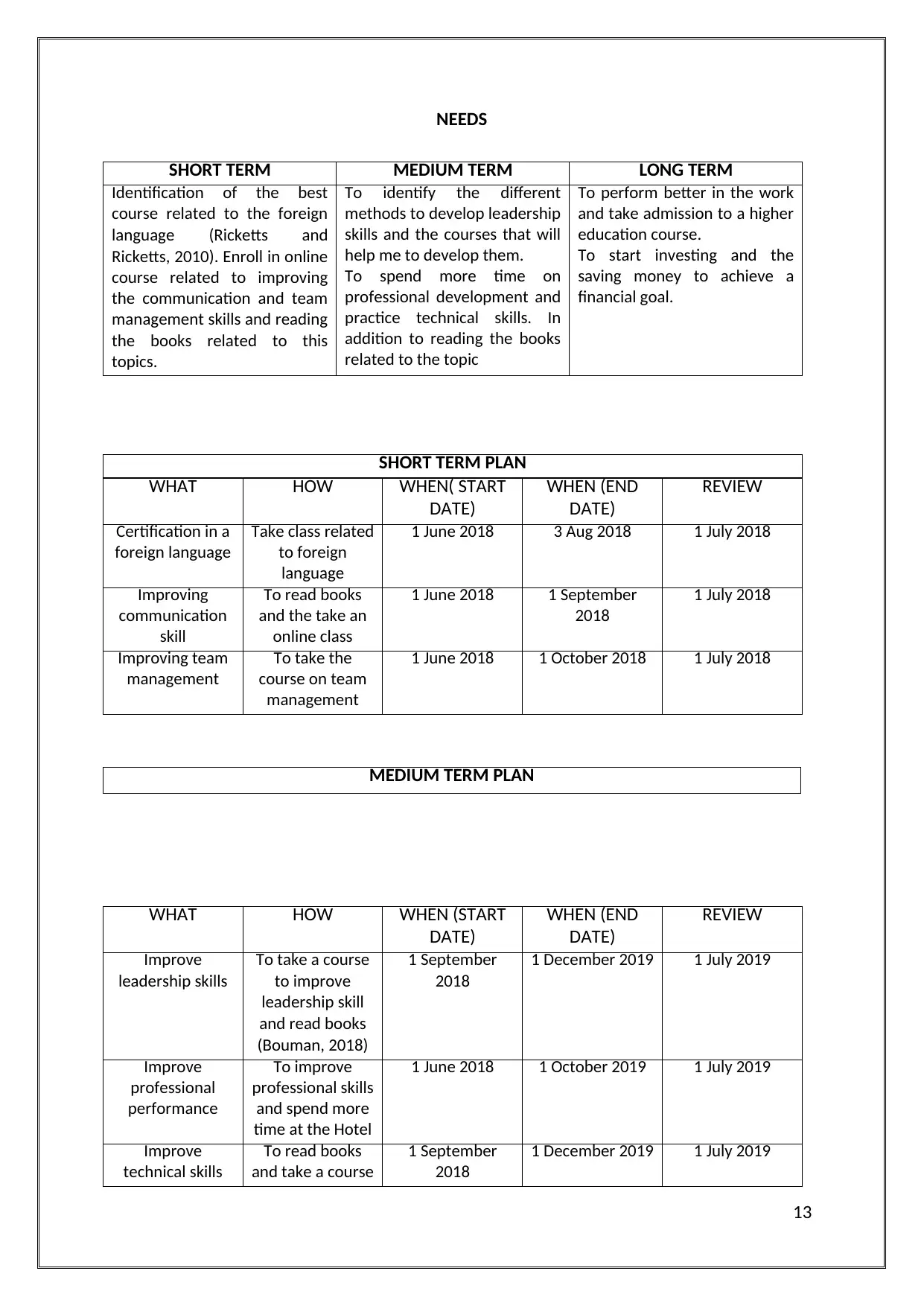
NEEDS
SHORT TERM MEDIUM TERM LONG TERM
Identification of the best
course related to the foreign
language (Ricketts and
Ricketts, 2010). Enroll in online
course related to improving
the communication and team
management skills and reading
the books related to this
topics.
To identify the different
methods to develop leadership
skills and the courses that will
help me to develop them.
To spend more time on
professional development and
practice technical skills. In
addition to reading the books
related to the topic
To perform better in the work
and take admission to a higher
education course.
To start investing and the
saving money to achieve a
financial goal.
13
SHORT TERM PLAN
WHAT HOW WHEN( START
DATE)
WHEN (END
DATE)
REVIEW
Certification in a
foreign language
Take class related
to foreign
language
1 June 2018 3 Aug 2018 1 July 2018
Improving
communication
skill
To read books
and the take an
online class
1 June 2018 1 September
2018
1 July 2018
Improving team
management
To take the
course on team
management
1 June 2018 1 October 2018 1 July 2018
MEDIUM TERM PLAN
WHAT HOW WHEN (START
DATE)
WHEN (END
DATE)
REVIEW
Improve
leadership skills
To take a course
to improve
leadership skill
and read books
(Bouman, 2018)
1 September
2018
1 December 2019 1 July 2019
Improve
professional
performance
To improve
professional skills
and spend more
time at the Hotel
1 June 2018 1 October 2019 1 July 2019
Improve
technical skills
To read books
and take a course
1 September
2018
1 December 2019 1 July 2019
SHORT TERM MEDIUM TERM LONG TERM
Identification of the best
course related to the foreign
language (Ricketts and
Ricketts, 2010). Enroll in online
course related to improving
the communication and team
management skills and reading
the books related to this
topics.
To identify the different
methods to develop leadership
skills and the courses that will
help me to develop them.
To spend more time on
professional development and
practice technical skills. In
addition to reading the books
related to the topic
To perform better in the work
and take admission to a higher
education course.
To start investing and the
saving money to achieve a
financial goal.
13
SHORT TERM PLAN
WHAT HOW WHEN( START
DATE)
WHEN (END
DATE)
REVIEW
Certification in a
foreign language
Take class related
to foreign
language
1 June 2018 3 Aug 2018 1 July 2018
Improving
communication
skill
To read books
and the take an
online class
1 June 2018 1 September
2018
1 July 2018
Improving team
management
To take the
course on team
management
1 June 2018 1 October 2018 1 July 2018
MEDIUM TERM PLAN
WHAT HOW WHEN (START
DATE)
WHEN (END
DATE)
REVIEW
Improve
leadership skills
To take a course
to improve
leadership skill
and read books
(Bouman, 2018)
1 September
2018
1 December 2019 1 July 2019
Improve
professional
performance
To improve
professional skills
and spend more
time at the Hotel
1 June 2018 1 October 2019 1 July 2019
Improve
technical skills
To read books
and take a course
1 September
2018
1 December 2019 1 July 2019
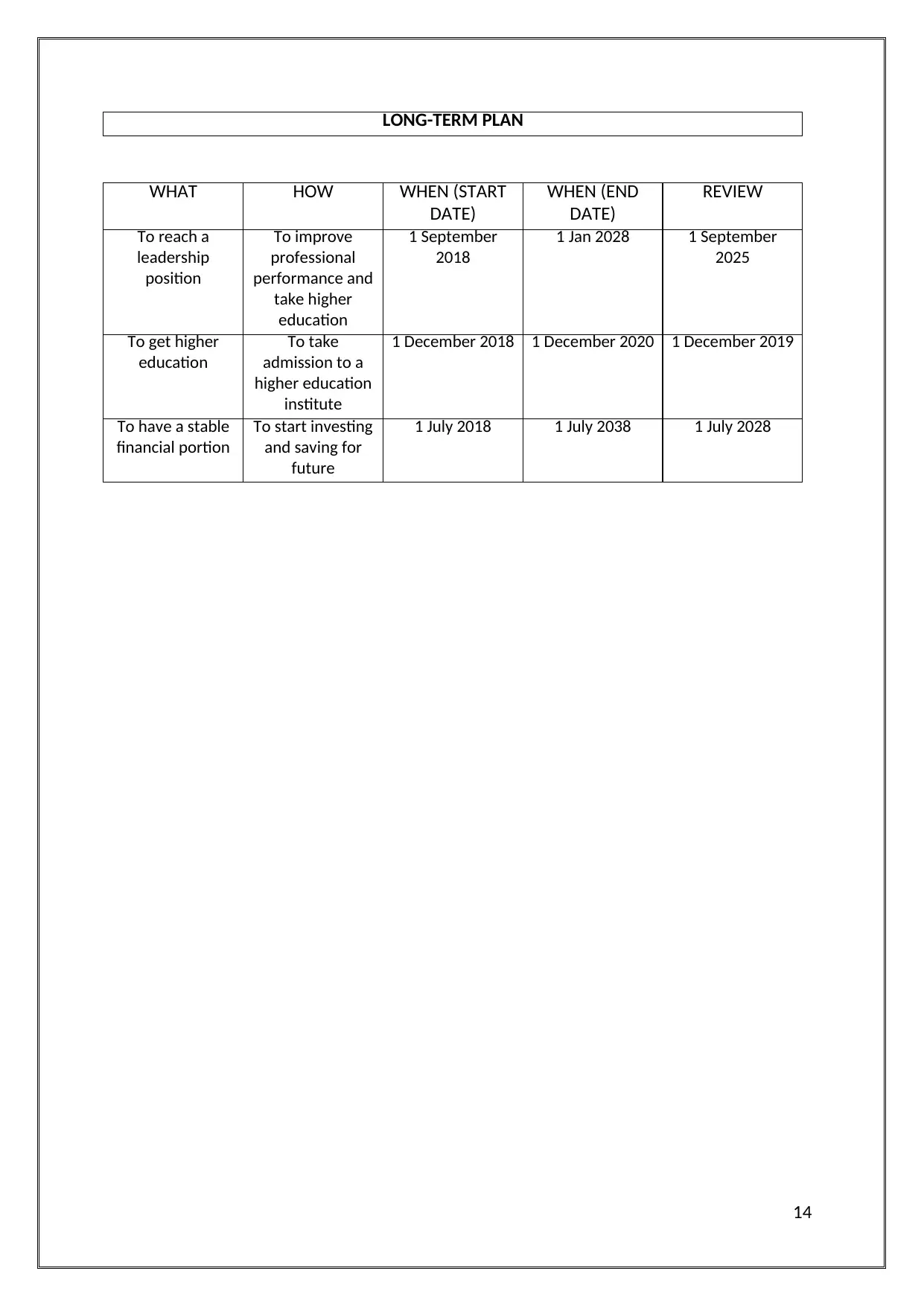
LONG-TERM PLAN
WHAT HOW WHEN (START
DATE)
WHEN (END
DATE)
REVIEW
To reach a
leadership
position
To improve
professional
performance and
take higher
education
1 September
2018
1 Jan 2028 1 September
2025
To get higher
education
To take
admission to a
higher education
institute
1 December 2018 1 December 2020 1 December 2019
To have a stable
financial portion
To start investing
and saving for
future
1 July 2018 1 July 2038 1 July 2028
14
WHAT HOW WHEN (START
DATE)
WHEN (END
DATE)
REVIEW
To reach a
leadership
position
To improve
professional
performance and
take higher
education
1 September
2018
1 Jan 2028 1 September
2025
To get higher
education
To take
admission to a
higher education
institute
1 December 2018 1 December 2020 1 December 2019
To have a stable
financial portion
To start investing
and saving for
future
1 July 2018 1 July 2038 1 July 2028
14
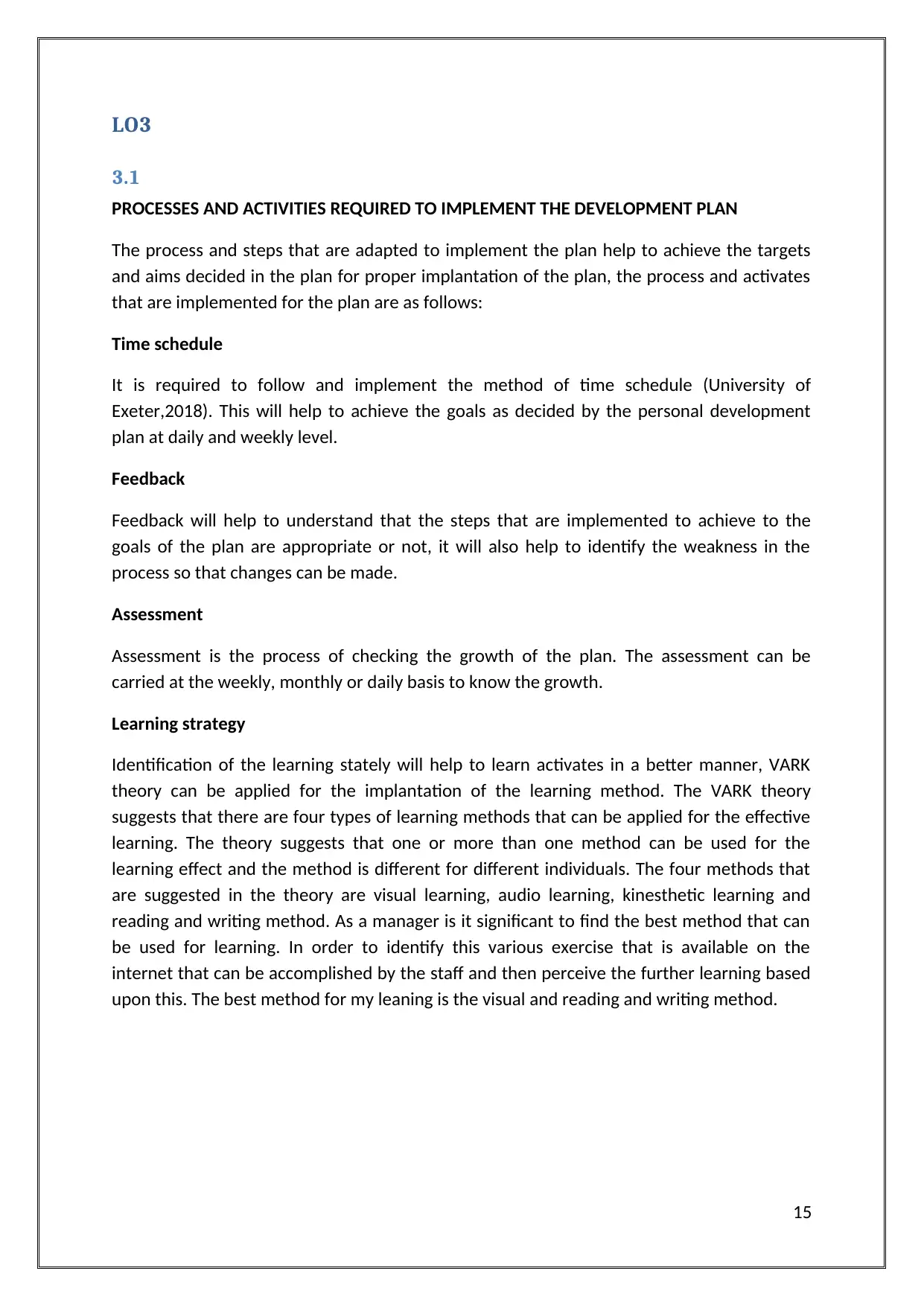
LO3
3.1
PROCESSES AND ACTIVITIES REQUIRED TO IMPLEMENT THE DEVELOPMENT PLAN
The process and steps that are adapted to implement the plan help to achieve the targets
and aims decided in the plan for proper implantation of the plan, the process and activates
that are implemented for the plan are as follows:
Time schedule
It is required to follow and implement the method of time schedule (University of
Exeter,2018). This will help to achieve the goals as decided by the personal development
plan at daily and weekly level.
Feedback
Feedback will help to understand that the steps that are implemented to achieve to the
goals of the plan are appropriate or not, it will also help to identify the weakness in the
process so that changes can be made.
Assessment
Assessment is the process of checking the growth of the plan. The assessment can be
carried at the weekly, monthly or daily basis to know the growth.
Learning strategy
Identification of the learning stately will help to learn activates in a better manner, VARK
theory can be applied for the implantation of the learning method. The VARK theory
suggests that there are four types of learning methods that can be applied for the effective
learning. The theory suggests that one or more than one method can be used for the
learning effect and the method is different for different individuals. The four methods that
are suggested in the theory are visual learning, audio learning, kinesthetic learning and
reading and writing method. As a manager is it significant to find the best method that can
be used for learning. In order to identify this various exercise that is available on the
internet that can be accomplished by the staff and then perceive the further learning based
upon this. The best method for my leaning is the visual and reading and writing method.
15
3.1
PROCESSES AND ACTIVITIES REQUIRED TO IMPLEMENT THE DEVELOPMENT PLAN
The process and steps that are adapted to implement the plan help to achieve the targets
and aims decided in the plan for proper implantation of the plan, the process and activates
that are implemented for the plan are as follows:
Time schedule
It is required to follow and implement the method of time schedule (University of
Exeter,2018). This will help to achieve the goals as decided by the personal development
plan at daily and weekly level.
Feedback
Feedback will help to understand that the steps that are implemented to achieve to the
goals of the plan are appropriate or not, it will also help to identify the weakness in the
process so that changes can be made.
Assessment
Assessment is the process of checking the growth of the plan. The assessment can be
carried at the weekly, monthly or daily basis to know the growth.
Learning strategy
Identification of the learning stately will help to learn activates in a better manner, VARK
theory can be applied for the implantation of the learning method. The VARK theory
suggests that there are four types of learning methods that can be applied for the effective
learning. The theory suggests that one or more than one method can be used for the
learning effect and the method is different for different individuals. The four methods that
are suggested in the theory are visual learning, audio learning, kinesthetic learning and
reading and writing method. As a manager is it significant to find the best method that can
be used for learning. In order to identify this various exercise that is available on the
internet that can be accomplished by the staff and then perceive the further learning based
upon this. The best method for my leaning is the visual and reading and writing method.
15
Secure Best Marks with AI Grader
Need help grading? Try our AI Grader for instant feedback on your assignments.
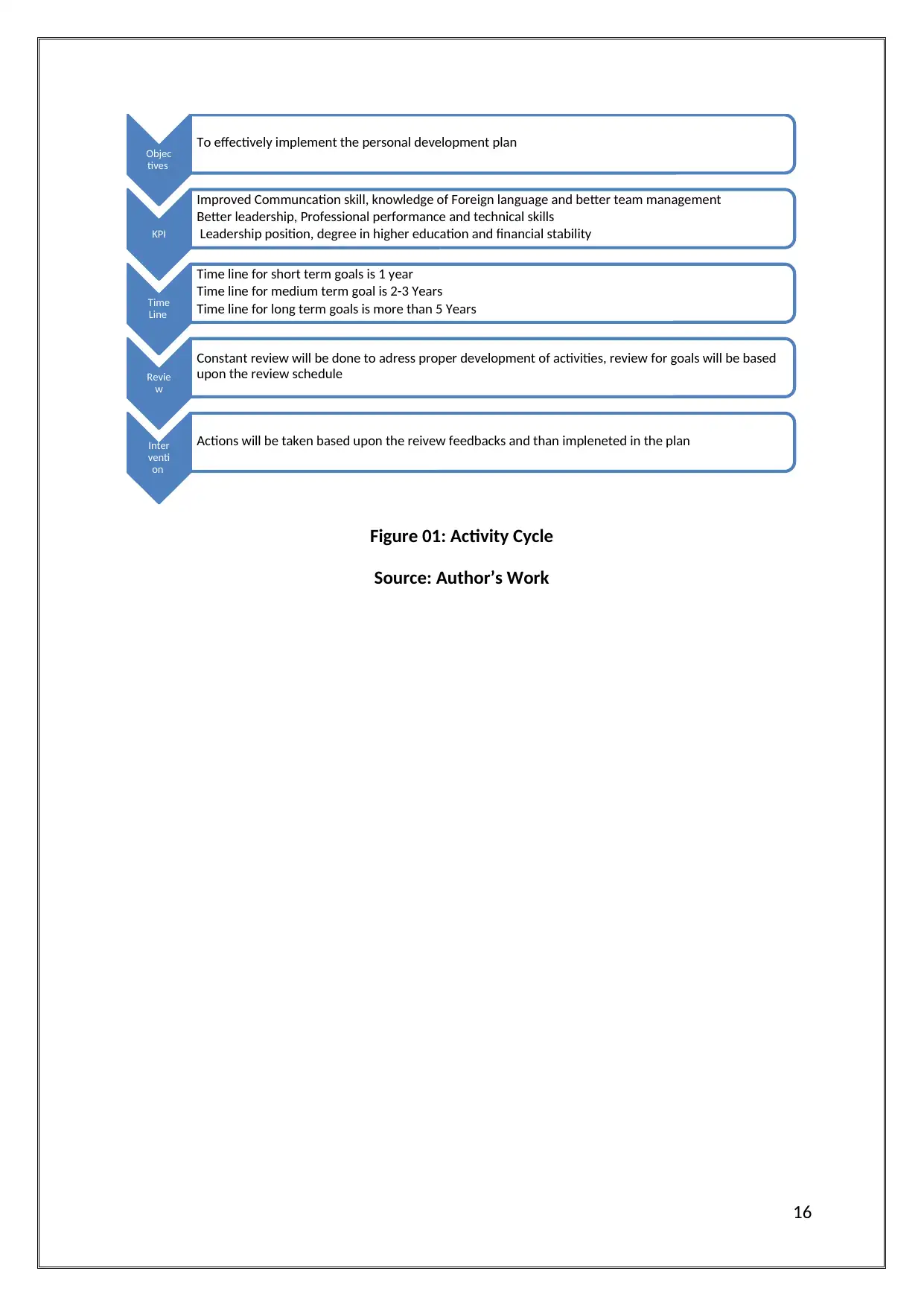
Figure 01: Activity Cycle
Source: Author’s Work
16
Objec
tives
To effectively implement the personal development plan
KPI
Improved Communcation skill, knowledge of Foreign language and better team management
Better leadership, Professional performance and technical skills
Leadership position, degree in higher education and financial stability
Time
Line
Time line for short term goals is 1 year
Time line for medium term goal is 2-3 Years
Time line for long term goals is more than 5 Years
Revie
w
Constant review will be done to adress proper development of activities, review for goals will be based
upon the review schedule
Inter
venti
on
Actions will be taken based upon the reivew feedbacks and than impleneted in the plan
Source: Author’s Work
16
Objec
tives
To effectively implement the personal development plan
KPI
Improved Communcation skill, knowledge of Foreign language and better team management
Better leadership, Professional performance and technical skills
Leadership position, degree in higher education and financial stability
Time
Line
Time line for short term goals is 1 year
Time line for medium term goal is 2-3 Years
Time line for long term goals is more than 5 Years
Revie
w
Constant review will be done to adress proper development of activities, review for goals will be based
upon the review schedule
Inter
venti
on
Actions will be taken based upon the reivew feedbacks and than impleneted in the plan
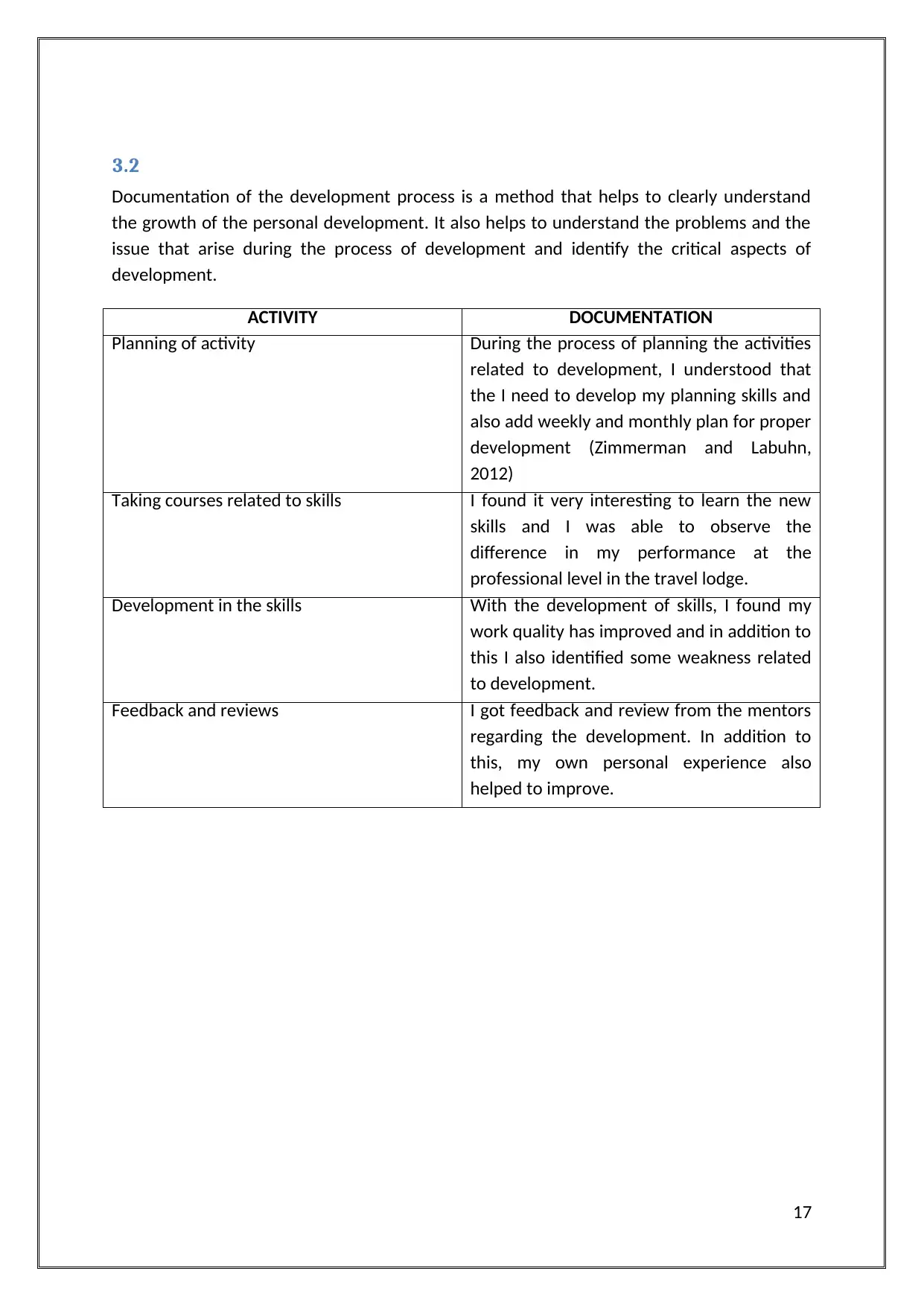
3.2
Documentation of the development process is a method that helps to clearly understand
the growth of the personal development. It also helps to understand the problems and the
issue that arise during the process of development and identify the critical aspects of
development.
ACTIVITY DOCUMENTATION
Planning of activity During the process of planning the activities
related to development, I understood that
the I need to develop my planning skills and
also add weekly and monthly plan for proper
development (Zimmerman and Labuhn,
2012)
Taking courses related to skills I found it very interesting to learn the new
skills and I was able to observe the
difference in my performance at the
professional level in the travel lodge.
Development in the skills With the development of skills, I found my
work quality has improved and in addition to
this I also identified some weakness related
to development.
Feedback and reviews I got feedback and review from the mentors
regarding the development. In addition to
this, my own personal experience also
helped to improve.
17
Documentation of the development process is a method that helps to clearly understand
the growth of the personal development. It also helps to understand the problems and the
issue that arise during the process of development and identify the critical aspects of
development.
ACTIVITY DOCUMENTATION
Planning of activity During the process of planning the activities
related to development, I understood that
the I need to develop my planning skills and
also add weekly and monthly plan for proper
development (Zimmerman and Labuhn,
2012)
Taking courses related to skills I found it very interesting to learn the new
skills and I was able to observe the
difference in my performance at the
professional level in the travel lodge.
Development in the skills With the development of skills, I found my
work quality has improved and in addition to
this I also identified some weakness related
to development.
Feedback and reviews I got feedback and review from the mentors
regarding the development. In addition to
this, my own personal experience also
helped to improve.
17
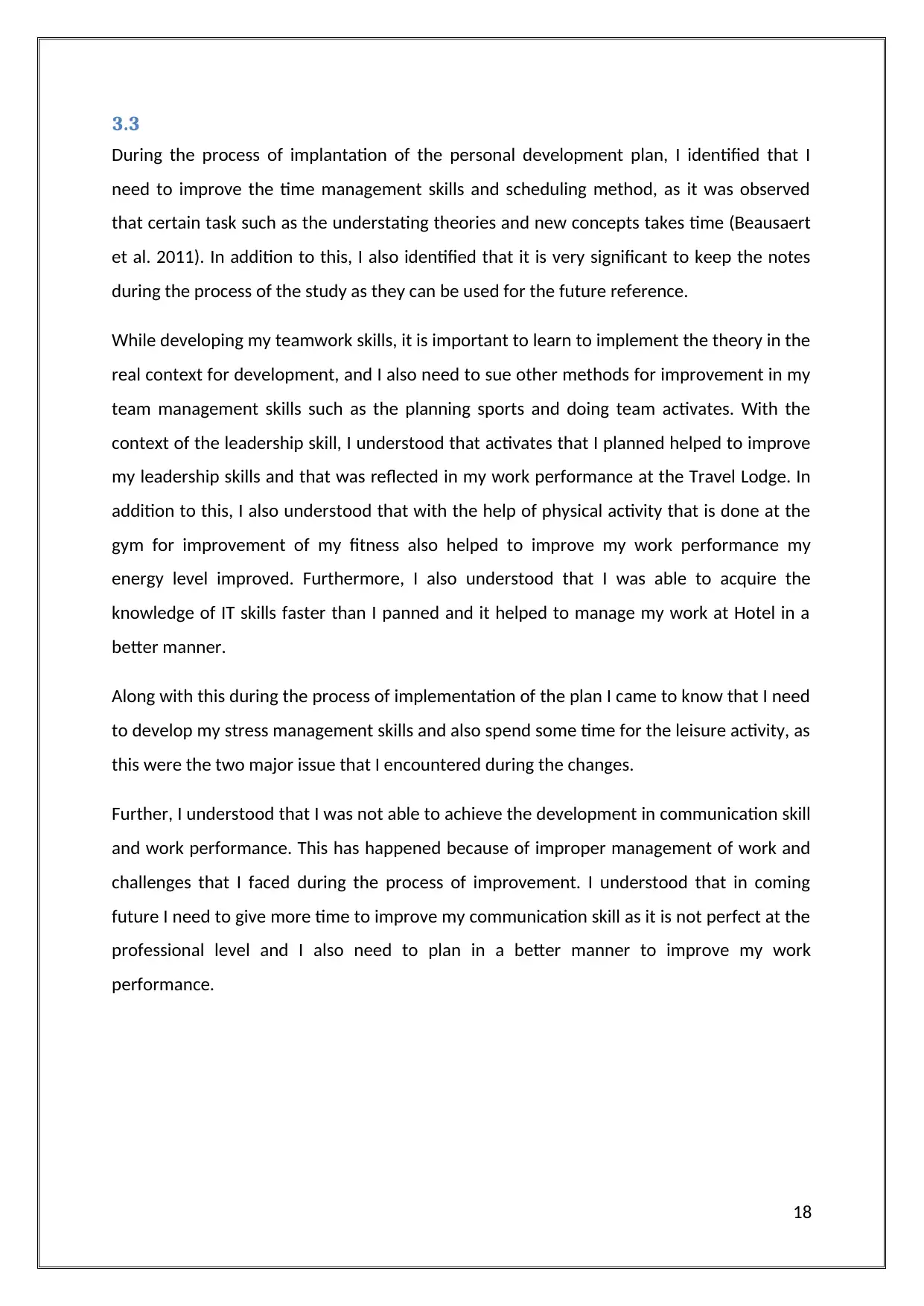
3.3
During the process of implantation of the personal development plan, I identified that I
need to improve the time management skills and scheduling method, as it was observed
that certain task such as the understating theories and new concepts takes time (Beausaert
et al. 2011). In addition to this, I also identified that it is very significant to keep the notes
during the process of the study as they can be used for the future reference.
While developing my teamwork skills, it is important to learn to implement the theory in the
real context for development, and I also need to sue other methods for improvement in my
team management skills such as the planning sports and doing team activates. With the
context of the leadership skill, I understood that activates that I planned helped to improve
my leadership skills and that was reflected in my work performance at the Travel Lodge. In
addition to this, I also understood that with the help of physical activity that is done at the
gym for improvement of my fitness also helped to improve my work performance my
energy level improved. Furthermore, I also understood that I was able to acquire the
knowledge of IT skills faster than I panned and it helped to manage my work at Hotel in a
better manner.
Along with this during the process of implementation of the plan I came to know that I need
to develop my stress management skills and also spend some time for the leisure activity, as
this were the two major issue that I encountered during the changes.
Further, I understood that I was not able to achieve the development in communication skill
and work performance. This has happened because of improper management of work and
challenges that I faced during the process of improvement. I understood that in coming
future I need to give more time to improve my communication skill as it is not perfect at the
professional level and I also need to plan in a better manner to improve my work
performance.
18
During the process of implantation of the personal development plan, I identified that I
need to improve the time management skills and scheduling method, as it was observed
that certain task such as the understating theories and new concepts takes time (Beausaert
et al. 2011). In addition to this, I also identified that it is very significant to keep the notes
during the process of the study as they can be used for the future reference.
While developing my teamwork skills, it is important to learn to implement the theory in the
real context for development, and I also need to sue other methods for improvement in my
team management skills such as the planning sports and doing team activates. With the
context of the leadership skill, I understood that activates that I planned helped to improve
my leadership skills and that was reflected in my work performance at the Travel Lodge. In
addition to this, I also understood that with the help of physical activity that is done at the
gym for improvement of my fitness also helped to improve my work performance my
energy level improved. Furthermore, I also understood that I was able to acquire the
knowledge of IT skills faster than I panned and it helped to manage my work at Hotel in a
better manner.
Along with this during the process of implementation of the plan I came to know that I need
to develop my stress management skills and also spend some time for the leisure activity, as
this were the two major issue that I encountered during the changes.
Further, I understood that I was not able to achieve the development in communication skill
and work performance. This has happened because of improper management of work and
challenges that I faced during the process of improvement. I understood that in coming
future I need to give more time to improve my communication skill as it is not perfect at the
professional level and I also need to plan in a better manner to improve my work
performance.
18
Paraphrase This Document
Need a fresh take? Get an instant paraphrase of this document with our AI Paraphraser
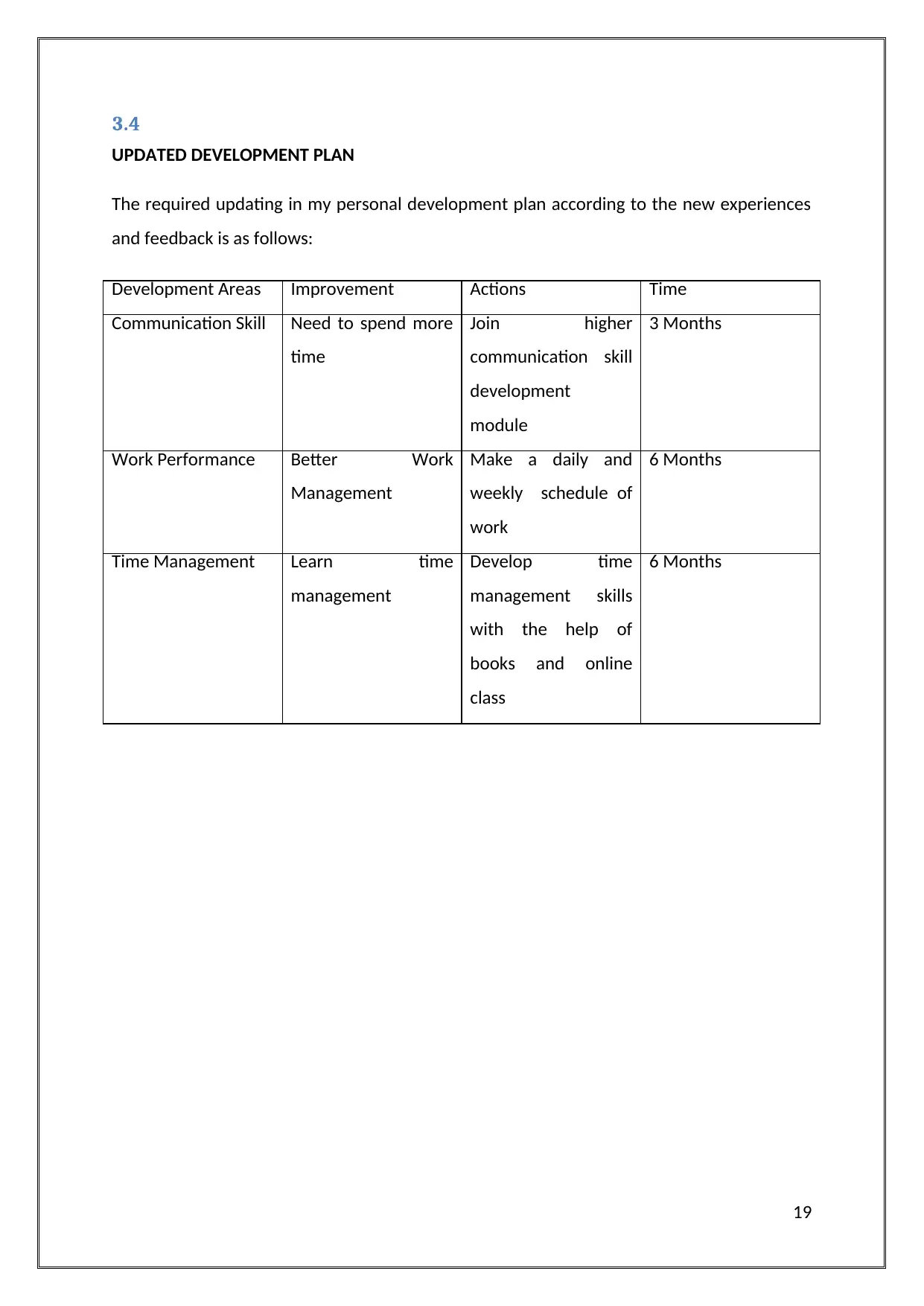
3.4
UPDATED DEVELOPMENT PLAN
The required updating in my personal development plan according to the new experiences
and feedback is as follows:
Development Areas Improvement Actions Time
Communication Skill Need to spend more
time
Join higher
communication skill
development
module
3 Months
Work Performance Better Work
Management
Make a daily and
weekly schedule of
work
6 Months
Time Management Learn time
management
Develop time
management skills
with the help of
books and online
class
6 Months
19
UPDATED DEVELOPMENT PLAN
The required updating in my personal development plan according to the new experiences
and feedback is as follows:
Development Areas Improvement Actions Time
Communication Skill Need to spend more
time
Join higher
communication skill
development
module
3 Months
Work Performance Better Work
Management
Make a daily and
weekly schedule of
work
6 Months
Time Management Learn time
management
Develop time
management skills
with the help of
books and online
class
6 Months
19
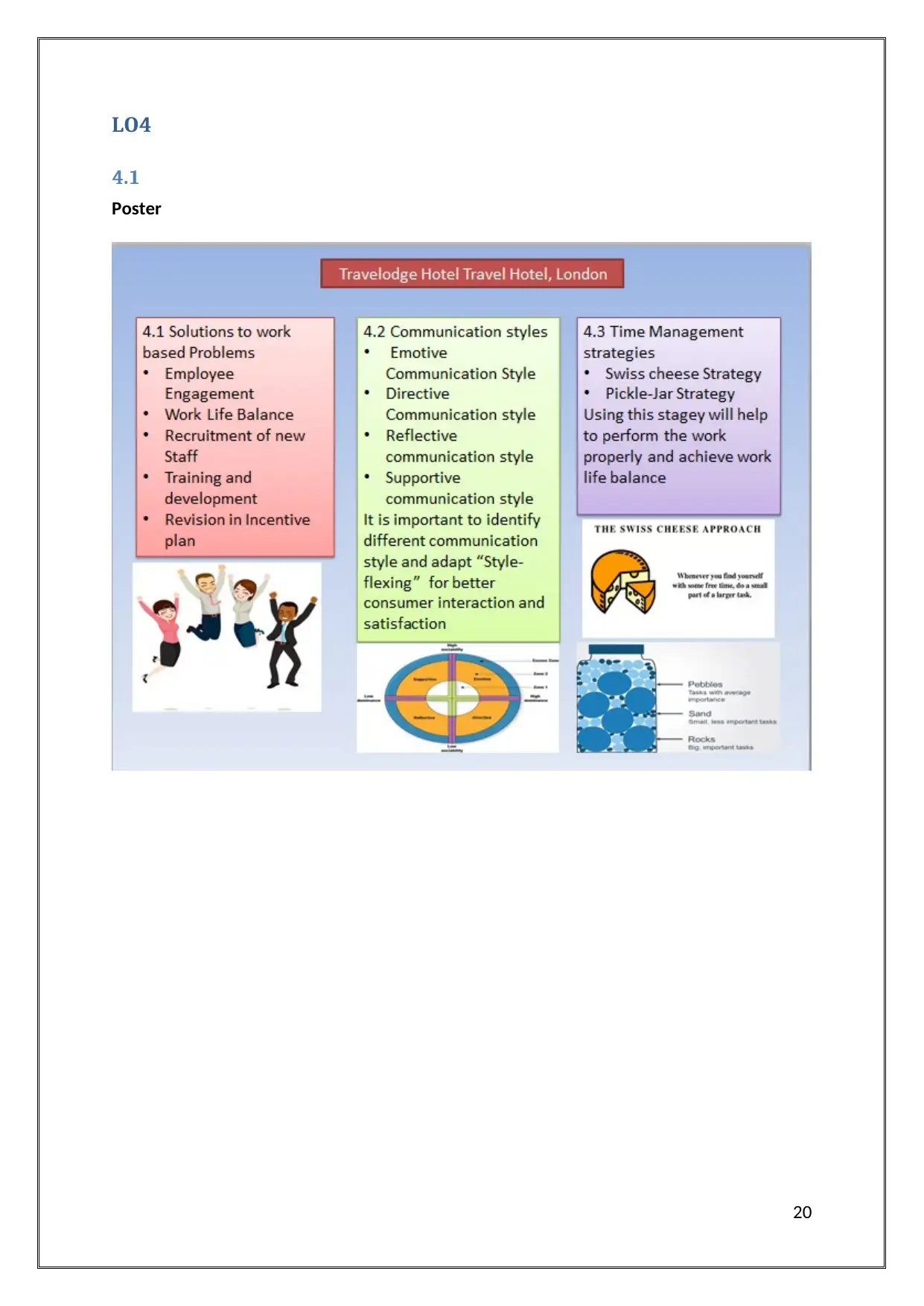
LO4
4.1
Poster
20
4.1
Poster
20
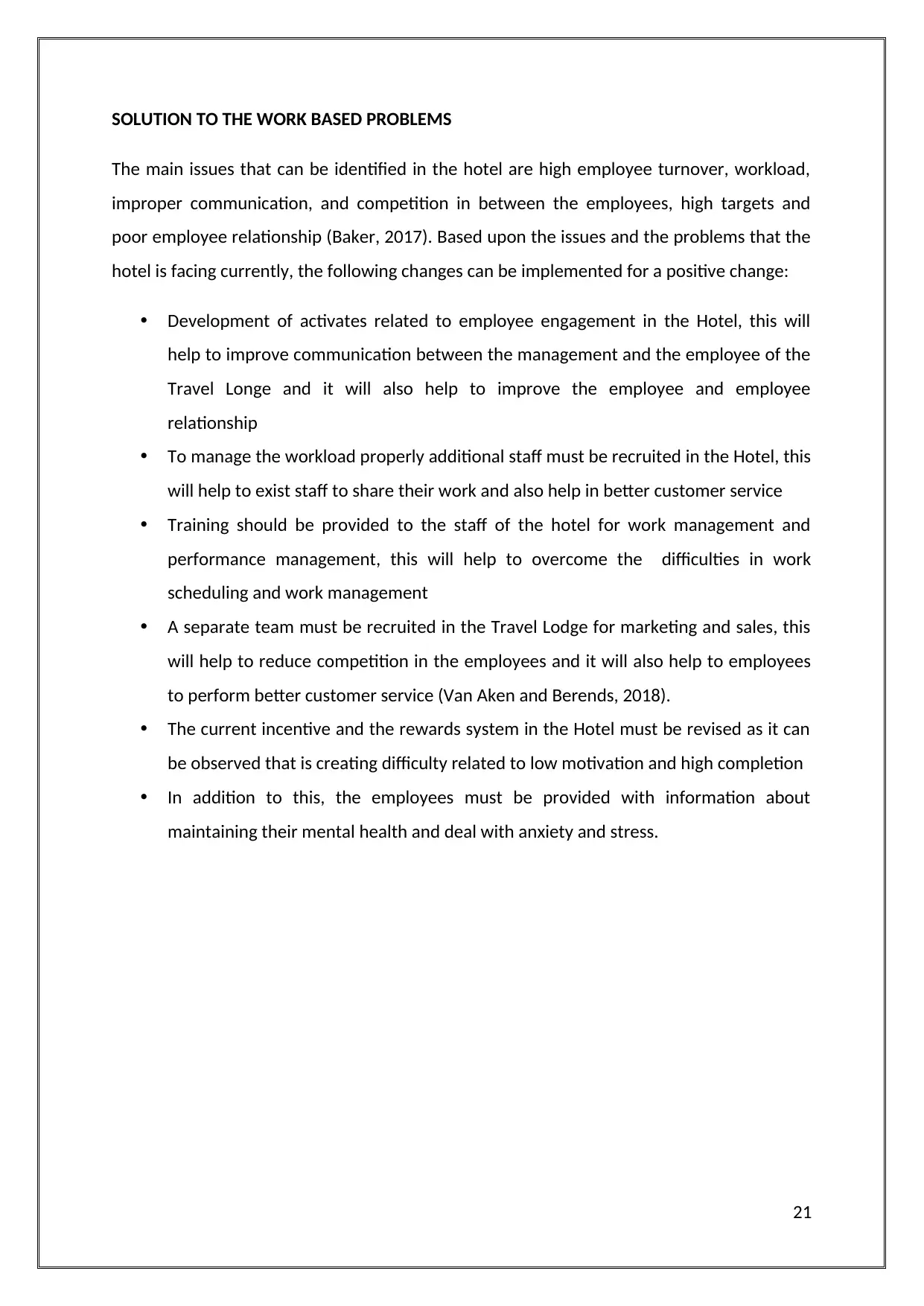
SOLUTION TO THE WORK BASED PROBLEMS
The main issues that can be identified in the hotel are high employee turnover, workload,
improper communication, and competition in between the employees, high targets and
poor employee relationship (Baker, 2017). Based upon the issues and the problems that the
hotel is facing currently, the following changes can be implemented for a positive change:
Development of activates related to employee engagement in the Hotel, this will
help to improve communication between the management and the employee of the
Travel Longe and it will also help to improve the employee and employee
relationship
To manage the workload properly additional staff must be recruited in the Hotel, this
will help to exist staff to share their work and also help in better customer service
Training should be provided to the staff of the hotel for work management and
performance management, this will help to overcome the difficulties in work
scheduling and work management
A separate team must be recruited in the Travel Lodge for marketing and sales, this
will help to reduce competition in the employees and it will also help to employees
to perform better customer service (Van Aken and Berends, 2018).
The current incentive and the rewards system in the Hotel must be revised as it can
be observed that is creating difficulty related to low motivation and high completion
In addition to this, the employees must be provided with information about
maintaining their mental health and deal with anxiety and stress.
21
The main issues that can be identified in the hotel are high employee turnover, workload,
improper communication, and competition in between the employees, high targets and
poor employee relationship (Baker, 2017). Based upon the issues and the problems that the
hotel is facing currently, the following changes can be implemented for a positive change:
Development of activates related to employee engagement in the Hotel, this will
help to improve communication between the management and the employee of the
Travel Longe and it will also help to improve the employee and employee
relationship
To manage the workload properly additional staff must be recruited in the Hotel, this
will help to exist staff to share their work and also help in better customer service
Training should be provided to the staff of the hotel for work management and
performance management, this will help to overcome the difficulties in work
scheduling and work management
A separate team must be recruited in the Travel Lodge for marketing and sales, this
will help to reduce competition in the employees and it will also help to employees
to perform better customer service (Van Aken and Berends, 2018).
The current incentive and the rewards system in the Hotel must be revised as it can
be observed that is creating difficulty related to low motivation and high completion
In addition to this, the employees must be provided with information about
maintaining their mental health and deal with anxiety and stress.
21
Secure Best Marks with AI Grader
Need help grading? Try our AI Grader for instant feedback on your assignments.
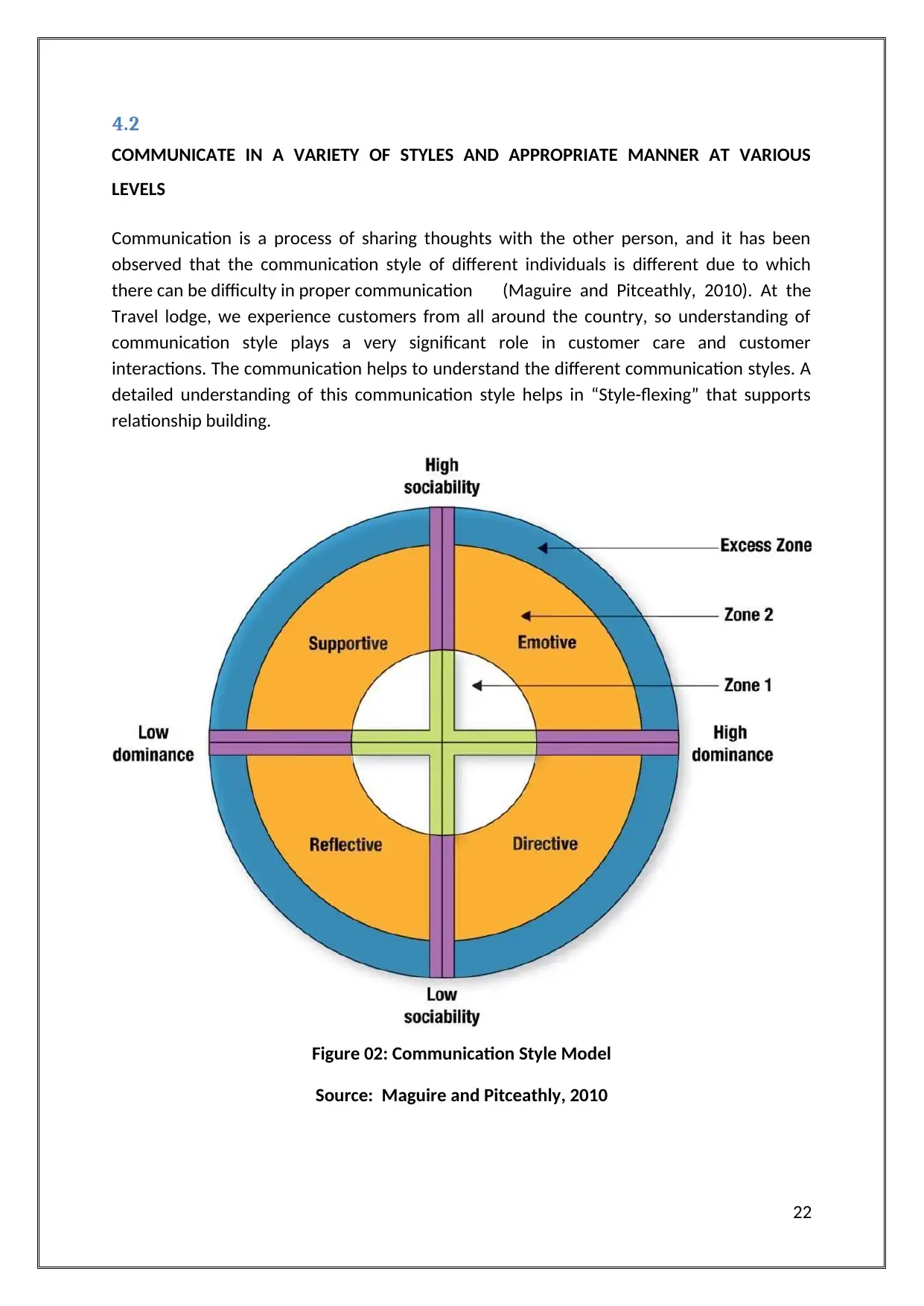
4.2
COMMUNICATE IN A VARIETY OF STYLES AND APPROPRIATE MANNER AT VARIOUS
LEVELS
Communication is a process of sharing thoughts with the other person, and it has been
observed that the communication style of different individuals is different due to which
there can be difficulty in proper communication (Maguire and Pitceathly, 2010). At the
Travel lodge, we experience customers from all around the country, so understanding of
communication style plays a very significant role in customer care and customer
interactions. The communication helps to understand the different communication styles. A
detailed understanding of this communication style helps in “Style-flexing” that supports
relationship building.
Figure 02: Communication Style Model
Source: Maguire and Pitceathly, 2010
22
COMMUNICATE IN A VARIETY OF STYLES AND APPROPRIATE MANNER AT VARIOUS
LEVELS
Communication is a process of sharing thoughts with the other person, and it has been
observed that the communication style of different individuals is different due to which
there can be difficulty in proper communication (Maguire and Pitceathly, 2010). At the
Travel lodge, we experience customers from all around the country, so understanding of
communication style plays a very significant role in customer care and customer
interactions. The communication helps to understand the different communication styles. A
detailed understanding of this communication style helps in “Style-flexing” that supports
relationship building.
Figure 02: Communication Style Model
Source: Maguire and Pitceathly, 2010
22
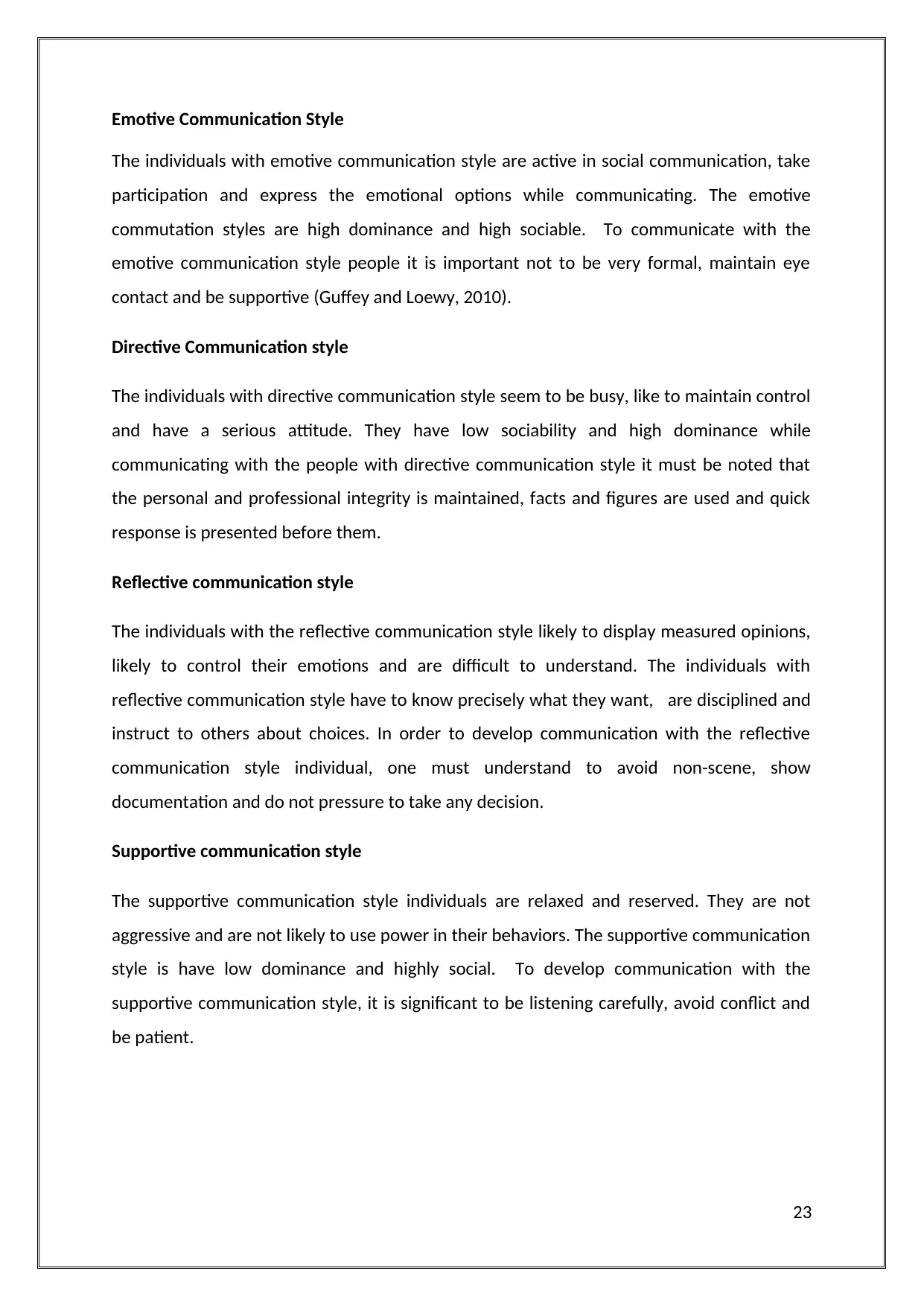
Emotive Communication Style
The individuals with emotive communication style are active in social communication, take
participation and express the emotional options while communicating. The emotive
commutation styles are high dominance and high sociable. To communicate with the
emotive communication style people it is important not to be very formal, maintain eye
contact and be supportive (Guffey and Loewy, 2010).
Directive Communication style
The individuals with directive communication style seem to be busy, like to maintain control
and have a serious attitude. They have low sociability and high dominance while
communicating with the people with directive communication style it must be noted that
the personal and professional integrity is maintained, facts and figures are used and quick
response is presented before them.
Reflective communication style
The individuals with the reflective communication style likely to display measured opinions,
likely to control their emotions and are difficult to understand. The individuals with
reflective communication style have to know precisely what they want, are disciplined and
instruct to others about choices. In order to develop communication with the reflective
communication style individual, one must understand to avoid non-scene, show
documentation and do not pressure to take any decision.
Supportive communication style
The supportive communication style individuals are relaxed and reserved. They are not
aggressive and are not likely to use power in their behaviors. The supportive communication
style is have low dominance and highly social. To develop communication with the
supportive communication style, it is significant to be listening carefully, avoid conflict and
be patient.
23
The individuals with emotive communication style are active in social communication, take
participation and express the emotional options while communicating. The emotive
commutation styles are high dominance and high sociable. To communicate with the
emotive communication style people it is important not to be very formal, maintain eye
contact and be supportive (Guffey and Loewy, 2010).
Directive Communication style
The individuals with directive communication style seem to be busy, like to maintain control
and have a serious attitude. They have low sociability and high dominance while
communicating with the people with directive communication style it must be noted that
the personal and professional integrity is maintained, facts and figures are used and quick
response is presented before them.
Reflective communication style
The individuals with the reflective communication style likely to display measured opinions,
likely to control their emotions and are difficult to understand. The individuals with
reflective communication style have to know precisely what they want, are disciplined and
instruct to others about choices. In order to develop communication with the reflective
communication style individual, one must understand to avoid non-scene, show
documentation and do not pressure to take any decision.
Supportive communication style
The supportive communication style individuals are relaxed and reserved. They are not
aggressive and are not likely to use power in their behaviors. The supportive communication
style is have low dominance and highly social. To develop communication with the
supportive communication style, it is significant to be listening carefully, avoid conflict and
be patient.
23
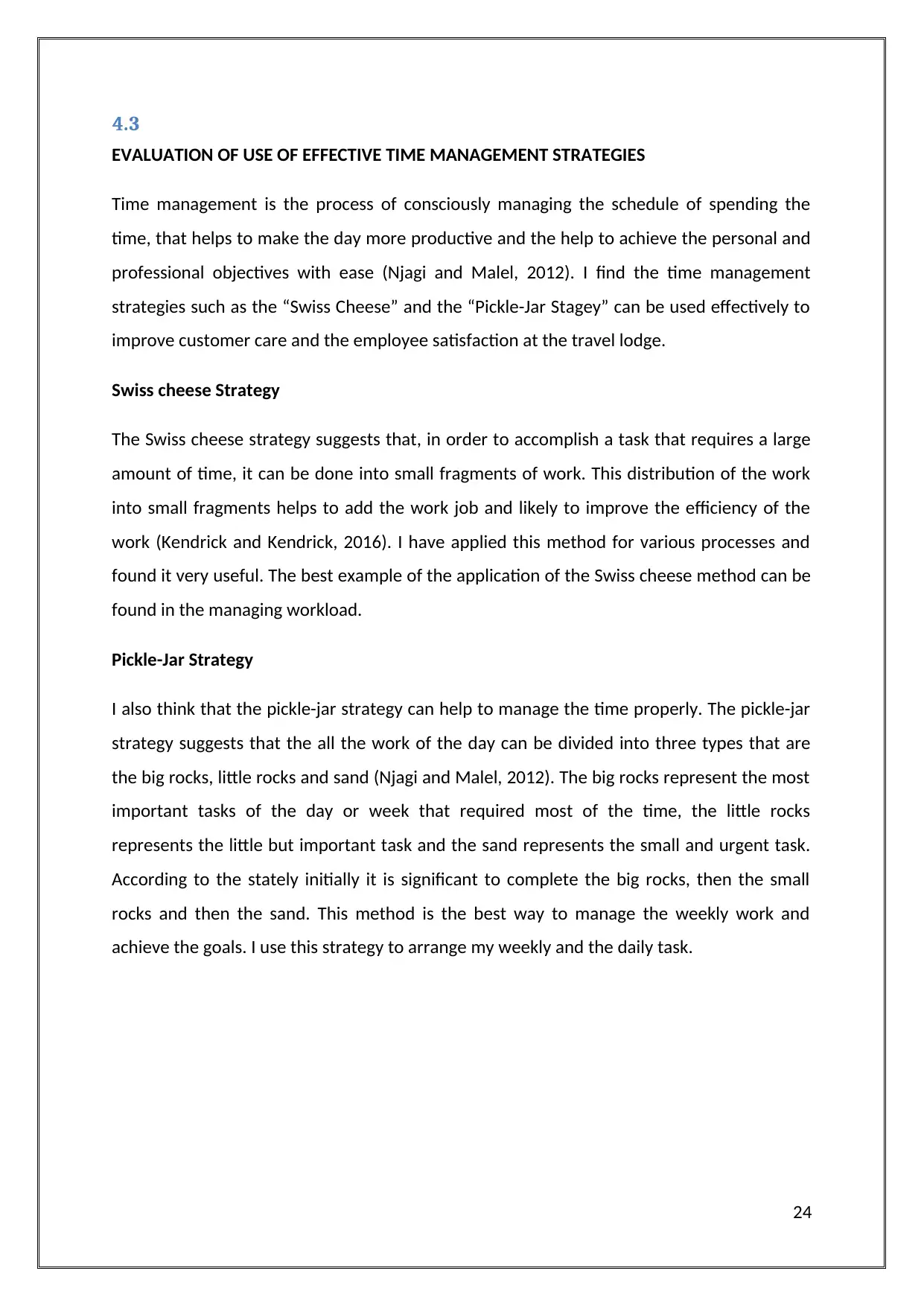
4.3
EVALUATION OF USE OF EFFECTIVE TIME MANAGEMENT STRATEGIES
Time management is the process of consciously managing the schedule of spending the
time, that helps to make the day more productive and the help to achieve the personal and
professional objectives with ease (Njagi and Malel, 2012). I find the time management
strategies such as the “Swiss Cheese” and the “Pickle-Jar Stagey” can be used effectively to
improve customer care and the employee satisfaction at the travel lodge.
Swiss cheese Strategy
The Swiss cheese strategy suggests that, in order to accomplish a task that requires a large
amount of time, it can be done into small fragments of work. This distribution of the work
into small fragments helps to add the work job and likely to improve the efficiency of the
work (Kendrick and Kendrick, 2016). I have applied this method for various processes and
found it very useful. The best example of the application of the Swiss cheese method can be
found in the managing workload.
Pickle-Jar Strategy
I also think that the pickle-jar strategy can help to manage the time properly. The pickle-jar
strategy suggests that the all the work of the day can be divided into three types that are
the big rocks, little rocks and sand (Njagi and Malel, 2012). The big rocks represent the most
important tasks of the day or week that required most of the time, the little rocks
represents the little but important task and the sand represents the small and urgent task.
According to the stately initially it is significant to complete the big rocks, then the small
rocks and then the sand. This method is the best way to manage the weekly work and
achieve the goals. I use this strategy to arrange my weekly and the daily task.
24
EVALUATION OF USE OF EFFECTIVE TIME MANAGEMENT STRATEGIES
Time management is the process of consciously managing the schedule of spending the
time, that helps to make the day more productive and the help to achieve the personal and
professional objectives with ease (Njagi and Malel, 2012). I find the time management
strategies such as the “Swiss Cheese” and the “Pickle-Jar Stagey” can be used effectively to
improve customer care and the employee satisfaction at the travel lodge.
Swiss cheese Strategy
The Swiss cheese strategy suggests that, in order to accomplish a task that requires a large
amount of time, it can be done into small fragments of work. This distribution of the work
into small fragments helps to add the work job and likely to improve the efficiency of the
work (Kendrick and Kendrick, 2016). I have applied this method for various processes and
found it very useful. The best example of the application of the Swiss cheese method can be
found in the managing workload.
Pickle-Jar Strategy
I also think that the pickle-jar strategy can help to manage the time properly. The pickle-jar
strategy suggests that the all the work of the day can be divided into three types that are
the big rocks, little rocks and sand (Njagi and Malel, 2012). The big rocks represent the most
important tasks of the day or week that required most of the time, the little rocks
represents the little but important task and the sand represents the small and urgent task.
According to the stately initially it is significant to complete the big rocks, then the small
rocks and then the sand. This method is the best way to manage the weekly work and
achieve the goals. I use this strategy to arrange my weekly and the daily task.
24
Paraphrase This Document
Need a fresh take? Get an instant paraphrase of this document with our AI Paraphraser
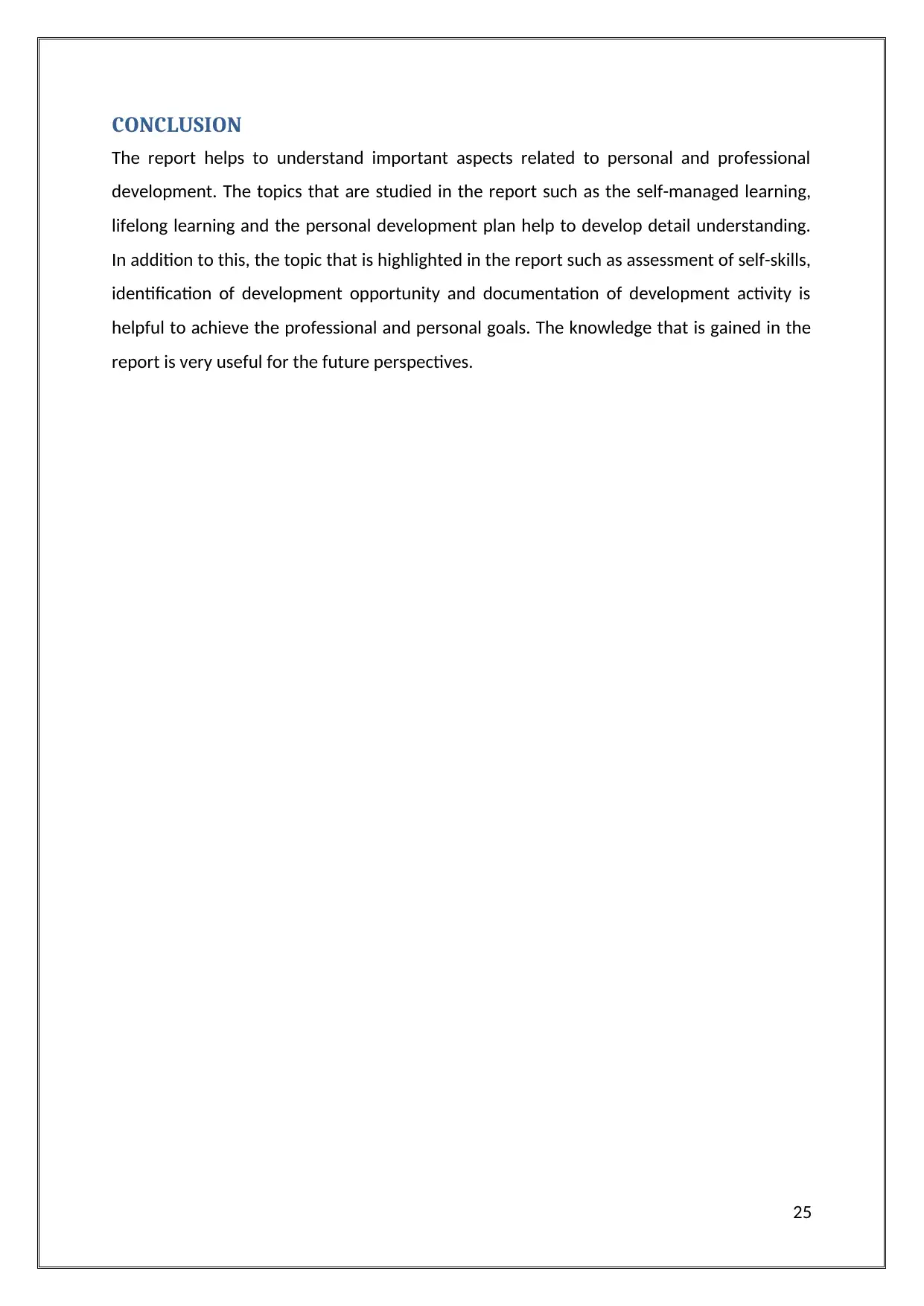
CONCLUSION
The report helps to understand important aspects related to personal and professional
development. The topics that are studied in the report such as the self-managed learning,
lifelong learning and the personal development plan help to develop detail understanding.
In addition to this, the topic that is highlighted in the report such as assessment of self-skills,
identification of development opportunity and documentation of development activity is
helpful to achieve the professional and personal goals. The knowledge that is gained in the
report is very useful for the future perspectives.
25
The report helps to understand important aspects related to personal and professional
development. The topics that are studied in the report such as the self-managed learning,
lifelong learning and the personal development plan help to develop detail understanding.
In addition to this, the topic that is highlighted in the report such as assessment of self-skills,
identification of development opportunity and documentation of development activity is
helpful to achieve the professional and personal goals. The knowledge that is gained in the
report is very useful for the future perspectives.
25
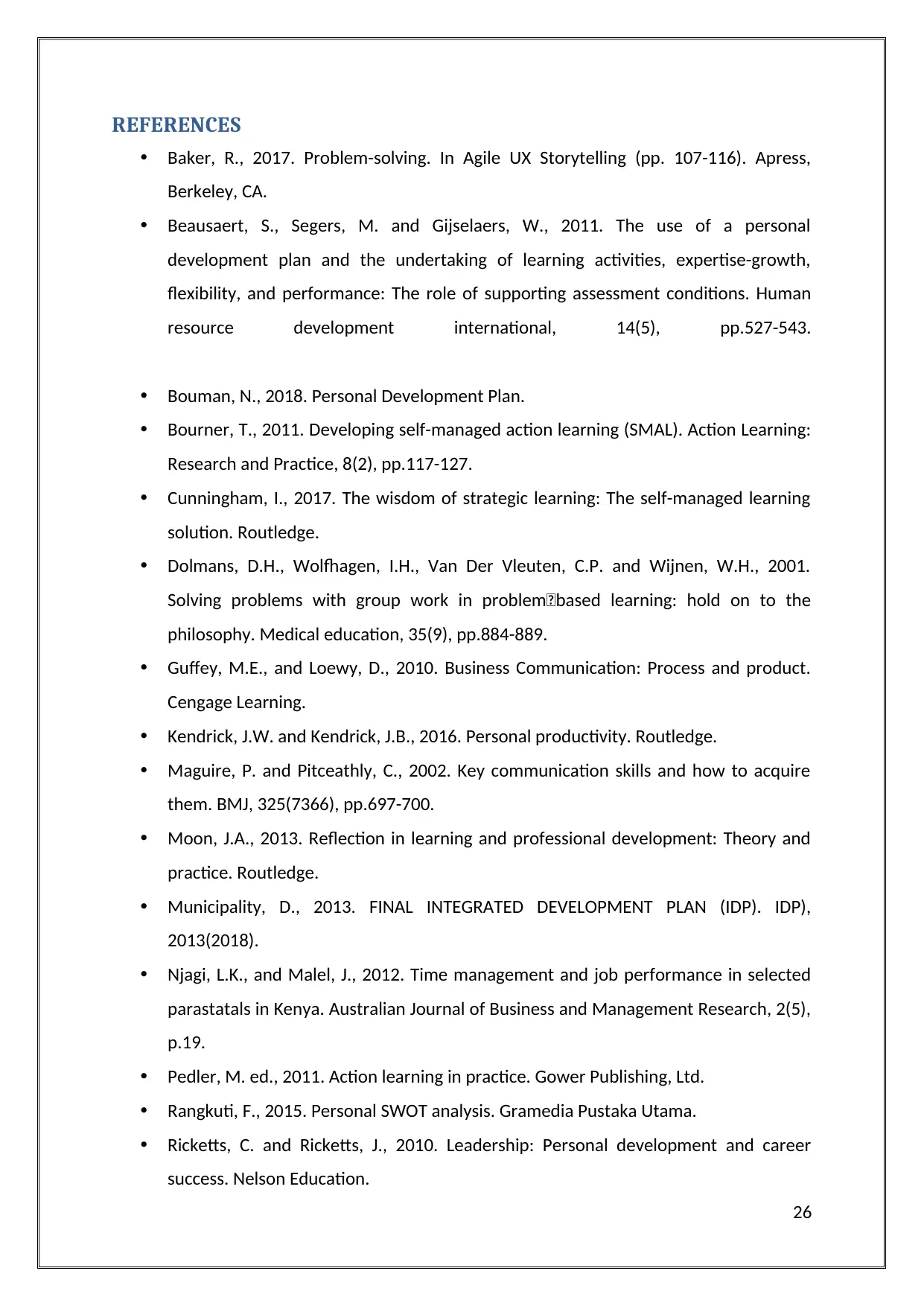
REFERENCES
Baker, R., 2017. Problem-solving. In Agile UX Storytelling (pp. 107-116). Apress,
Berkeley, CA.
Beausaert, S., Segers, M. and Gijselaers, W., 2011. The use of a personal
development plan and the undertaking of learning activities, expertise-growth,
flexibility, and performance: The role of supporting assessment conditions. Human
resource development international, 14(5), pp.527-543.
Bouman, N., 2018. Personal Development Plan.
Bourner, T., 2011. Developing self-managed action learning (SMAL). Action Learning:
Research and Practice, 8(2), pp.117-127.
Cunningham, I., 2017. The wisdom of strategic learning: The self-managed learning
solution. Routledge.
Dolmans, D.H., Wolfhagen, I.H., Van Der Vleuten, C.P. and Wijnen, W.H., 2001.
Solving problems with group work in problem‐based learning: hold on to the
philosophy. Medical education, 35(9), pp.884-889.
Guffey, M.E., and Loewy, D., 2010. Business Communication: Process and product.
Cengage Learning.
Kendrick, J.W. and Kendrick, J.B., 2016. Personal productivity. Routledge.
Maguire, P. and Pitceathly, C., 2002. Key communication skills and how to acquire
them. BMJ, 325(7366), pp.697-700.
Moon, J.A., 2013. Reflection in learning and professional development: Theory and
practice. Routledge.
Municipality, D., 2013. FINAL INTEGRATED DEVELOPMENT PLAN (IDP). IDP),
2013(2018).
Njagi, L.K., and Malel, J., 2012. Time management and job performance in selected
parastatals in Kenya. Australian Journal of Business and Management Research, 2(5),
p.19.
Pedler, M. ed., 2011. Action learning in practice. Gower Publishing, Ltd.
Rangkuti, F., 2015. Personal SWOT analysis. Gramedia Pustaka Utama.
Ricketts, C. and Ricketts, J., 2010. Leadership: Personal development and career
success. Nelson Education.
26
Baker, R., 2017. Problem-solving. In Agile UX Storytelling (pp. 107-116). Apress,
Berkeley, CA.
Beausaert, S., Segers, M. and Gijselaers, W., 2011. The use of a personal
development plan and the undertaking of learning activities, expertise-growth,
flexibility, and performance: The role of supporting assessment conditions. Human
resource development international, 14(5), pp.527-543.
Bouman, N., 2018. Personal Development Plan.
Bourner, T., 2011. Developing self-managed action learning (SMAL). Action Learning:
Research and Practice, 8(2), pp.117-127.
Cunningham, I., 2017. The wisdom of strategic learning: The self-managed learning
solution. Routledge.
Dolmans, D.H., Wolfhagen, I.H., Van Der Vleuten, C.P. and Wijnen, W.H., 2001.
Solving problems with group work in problem‐based learning: hold on to the
philosophy. Medical education, 35(9), pp.884-889.
Guffey, M.E., and Loewy, D., 2010. Business Communication: Process and product.
Cengage Learning.
Kendrick, J.W. and Kendrick, J.B., 2016. Personal productivity. Routledge.
Maguire, P. and Pitceathly, C., 2002. Key communication skills and how to acquire
them. BMJ, 325(7366), pp.697-700.
Moon, J.A., 2013. Reflection in learning and professional development: Theory and
practice. Routledge.
Municipality, D., 2013. FINAL INTEGRATED DEVELOPMENT PLAN (IDP). IDP),
2013(2018).
Njagi, L.K., and Malel, J., 2012. Time management and job performance in selected
parastatals in Kenya. Australian Journal of Business and Management Research, 2(5),
p.19.
Pedler, M. ed., 2011. Action learning in practice. Gower Publishing, Ltd.
Rangkuti, F., 2015. Personal SWOT analysis. Gramedia Pustaka Utama.
Ricketts, C. and Ricketts, J., 2010. Leadership: Personal development and career
success. Nelson Education.
26
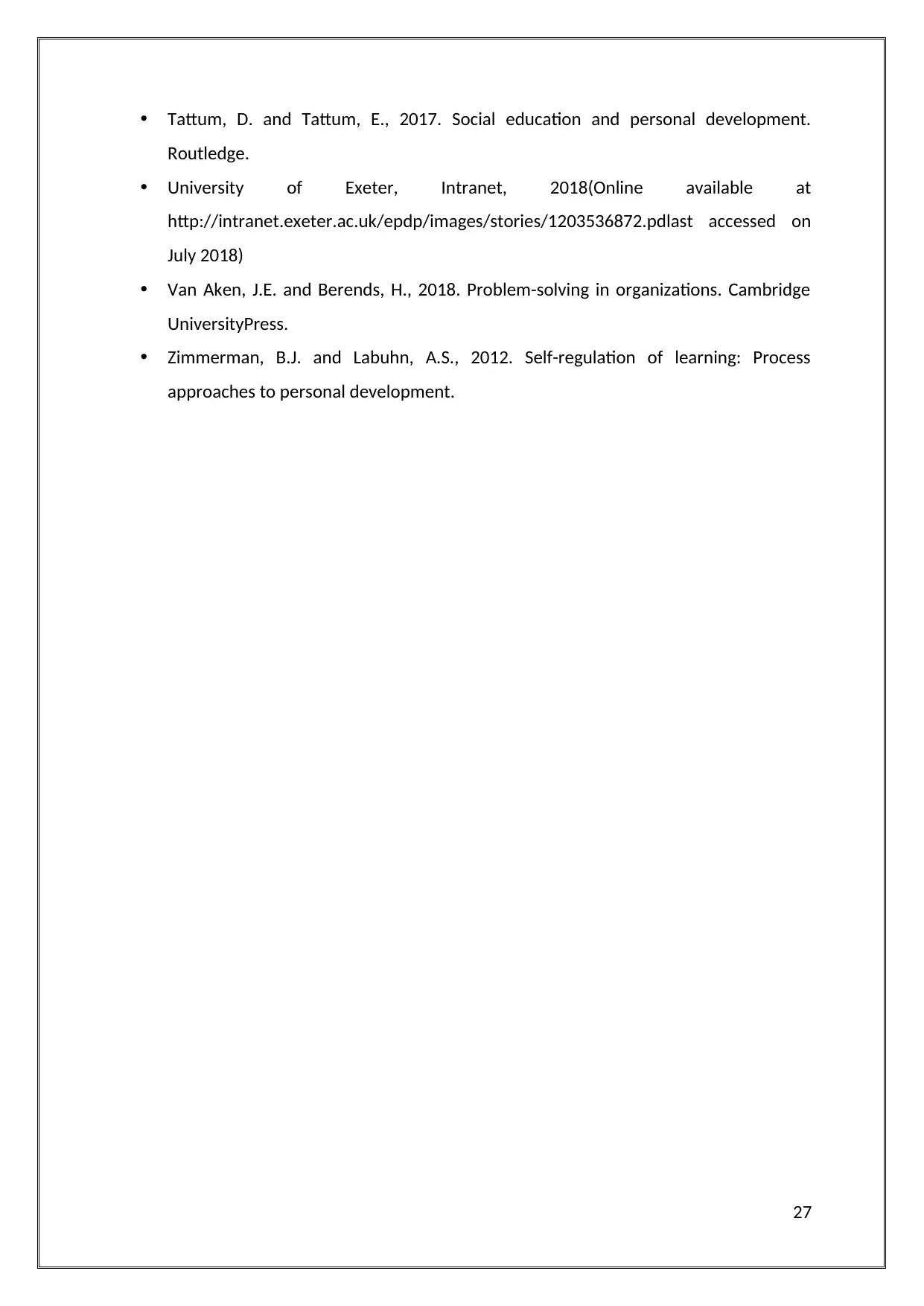
Tattum, D. and Tattum, E., 2017. Social education and personal development.
Routledge.
University of Exeter, Intranet, 2018(Online available at
http://intranet.exeter.ac.uk/epdp/images/stories/1203536872.pdlast accessed on
July 2018)
Van Aken, J.E. and Berends, H., 2018. Problem-solving in organizations. Cambridge
UniversityPress.
Zimmerman, B.J. and Labuhn, A.S., 2012. Self-regulation of learning: Process
approaches to personal development.
27
Routledge.
University of Exeter, Intranet, 2018(Online available at
http://intranet.exeter.ac.uk/epdp/images/stories/1203536872.pdlast accessed on
July 2018)
Van Aken, J.E. and Berends, H., 2018. Problem-solving in organizations. Cambridge
UniversityPress.
Zimmerman, B.J. and Labuhn, A.S., 2012. Self-regulation of learning: Process
approaches to personal development.
27
1 out of 28
Related Documents
Your All-in-One AI-Powered Toolkit for Academic Success.
+13062052269
info@desklib.com
Available 24*7 on WhatsApp / Email
![[object Object]](/_next/static/media/star-bottom.7253800d.svg)
Unlock your academic potential
© 2024 | Zucol Services PVT LTD | All rights reserved.





